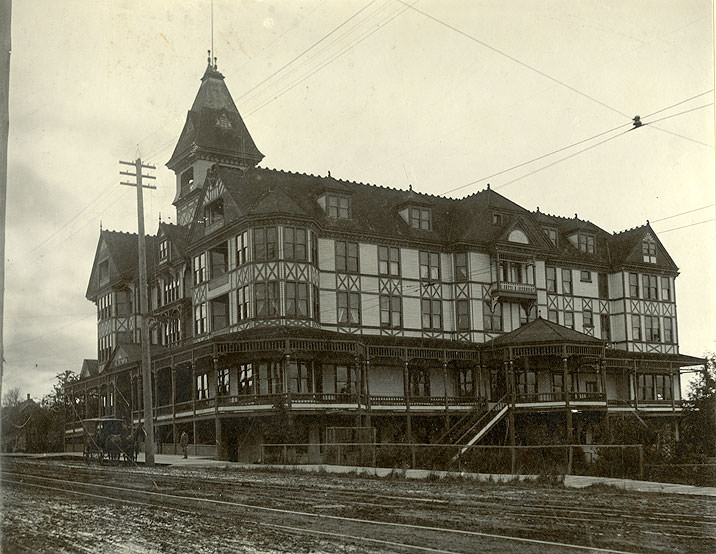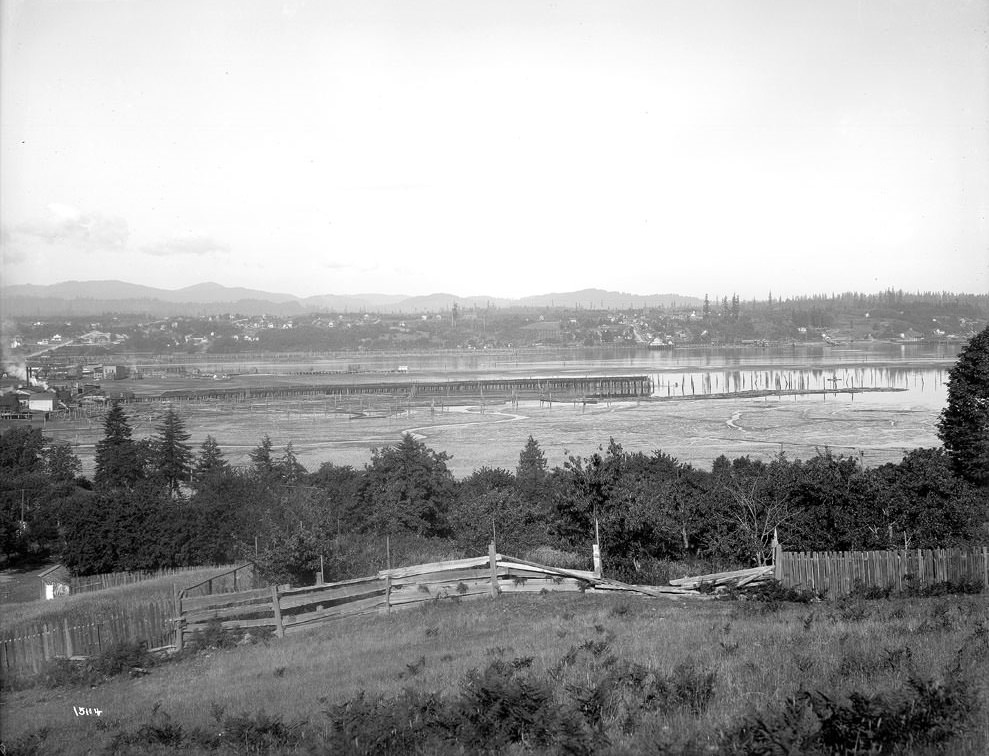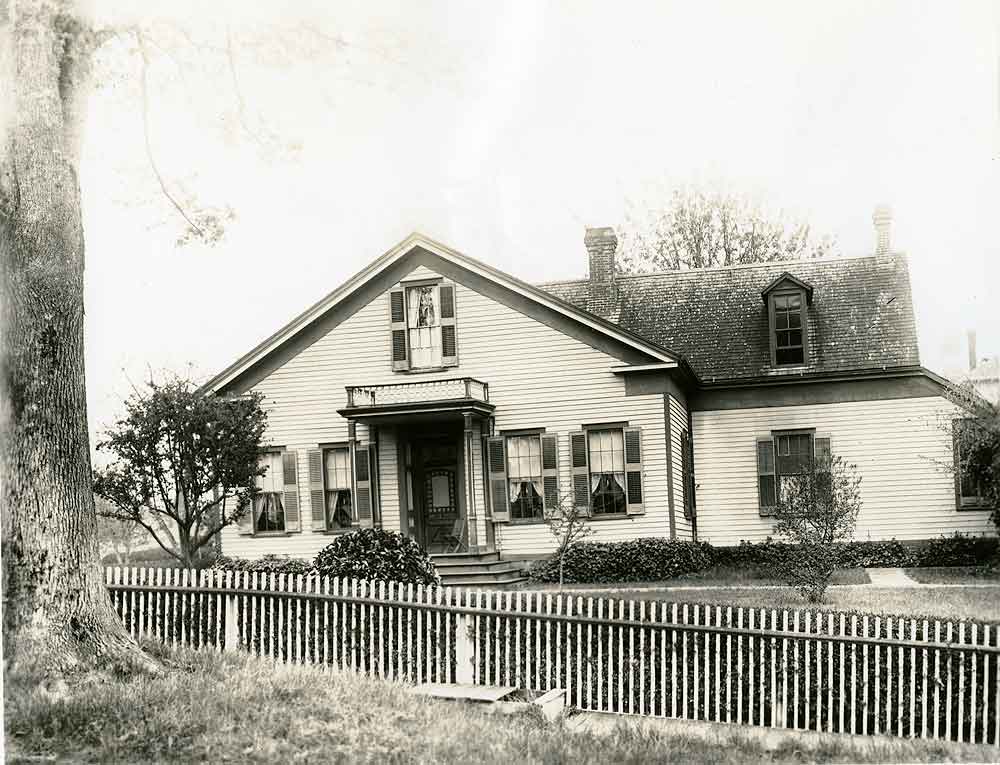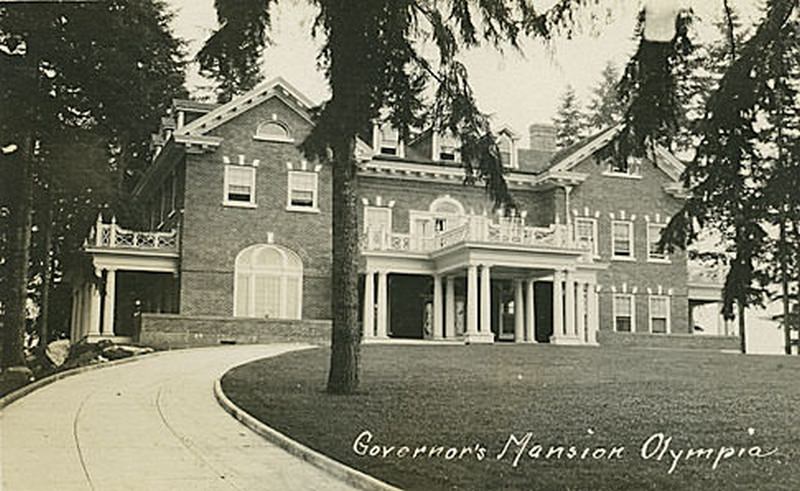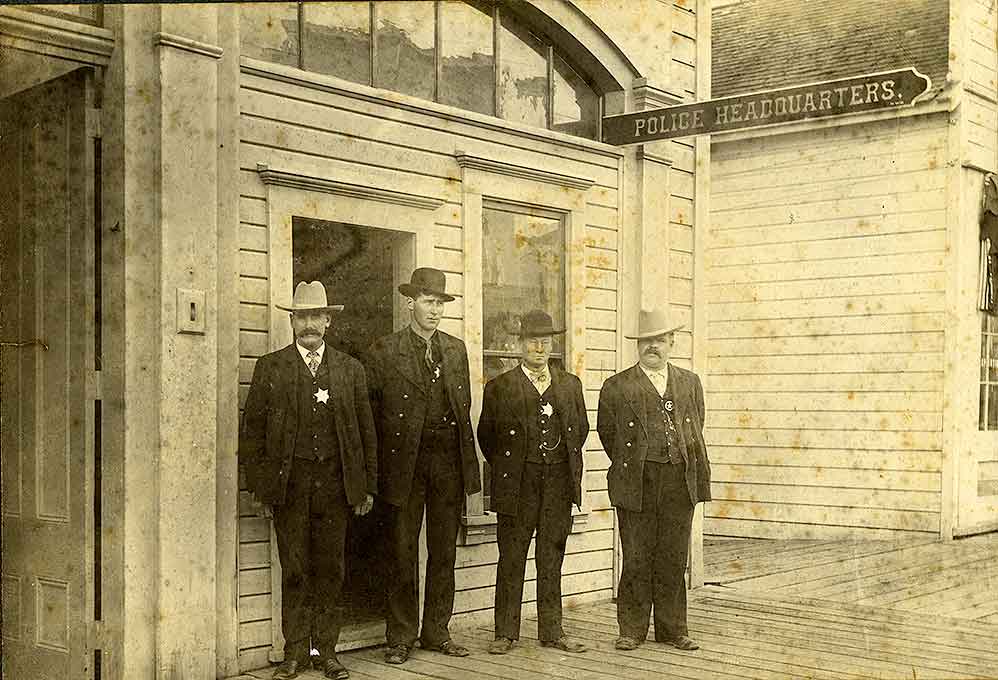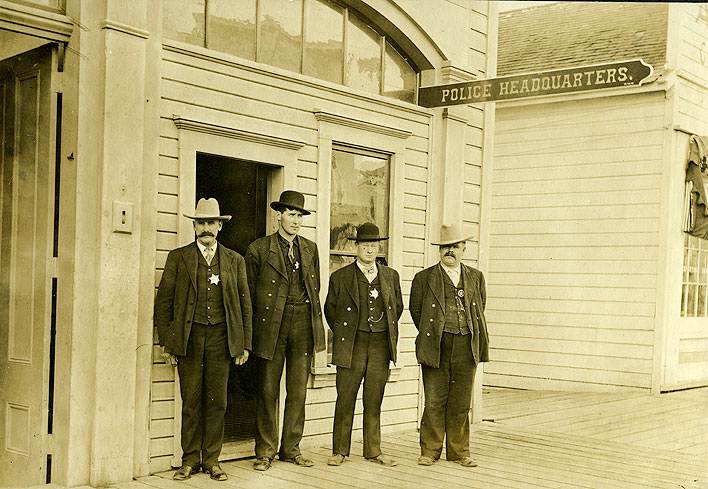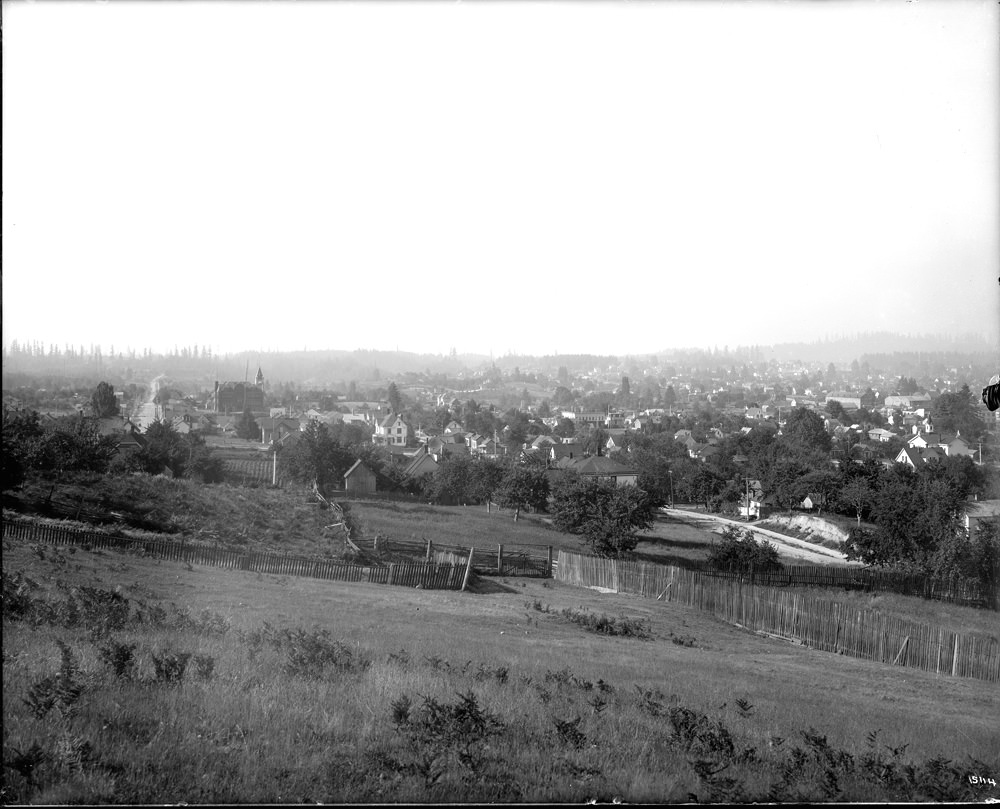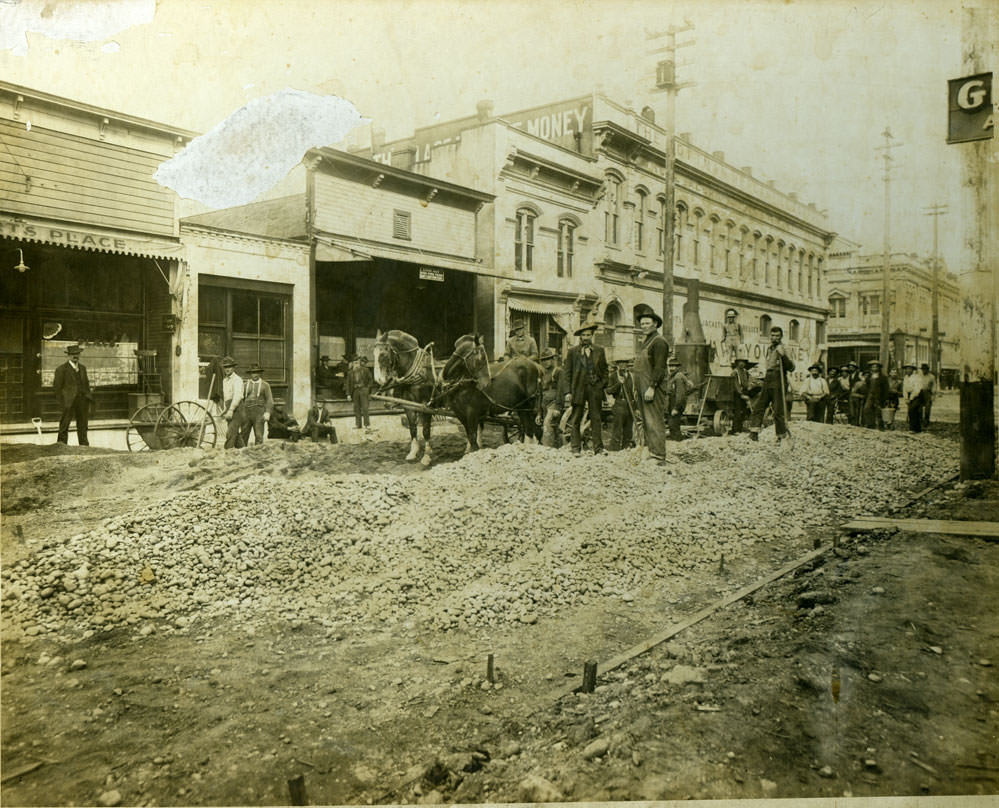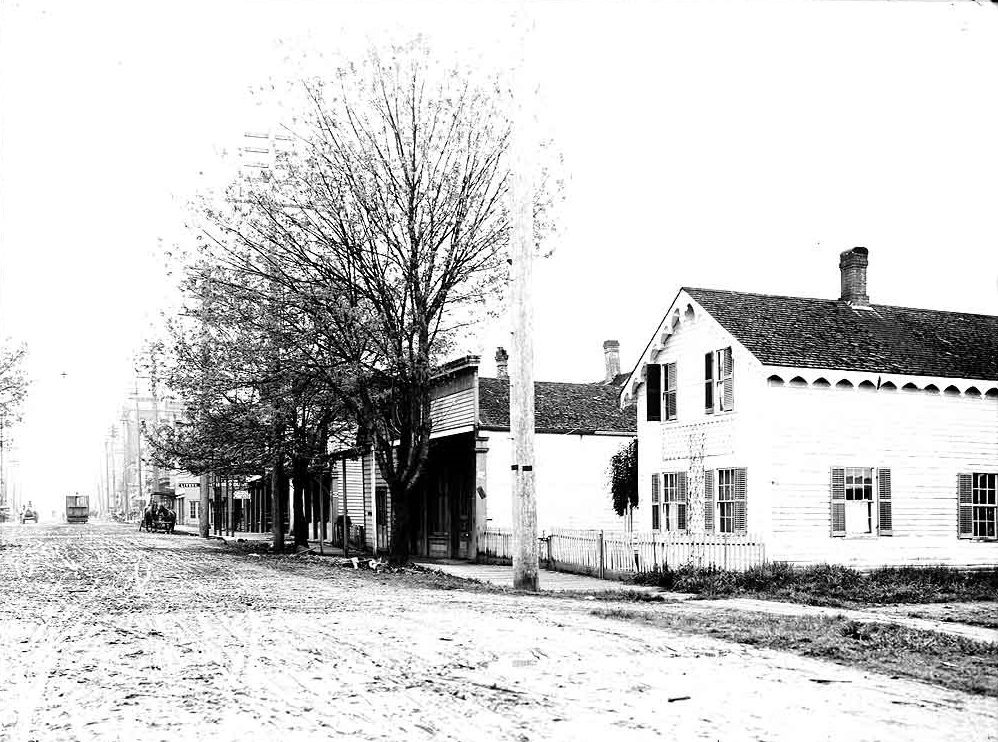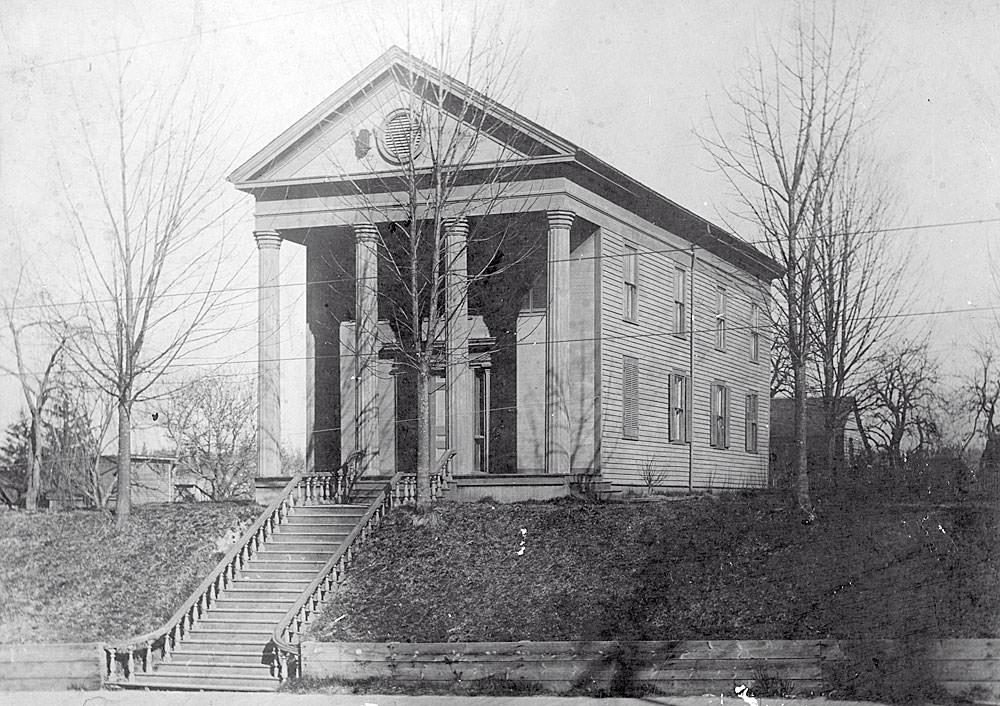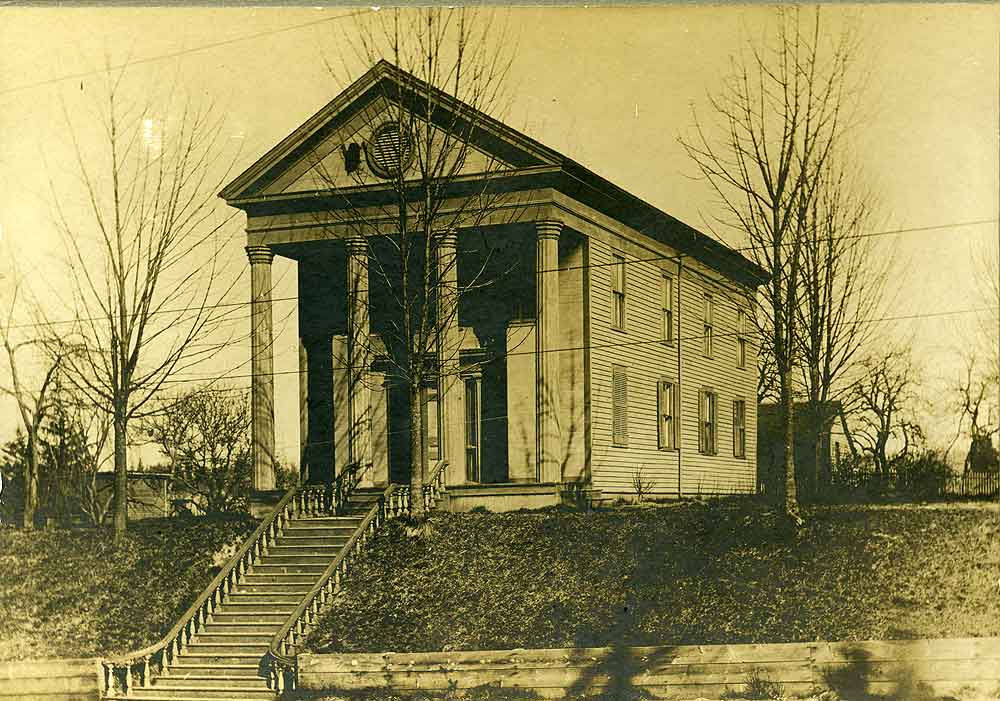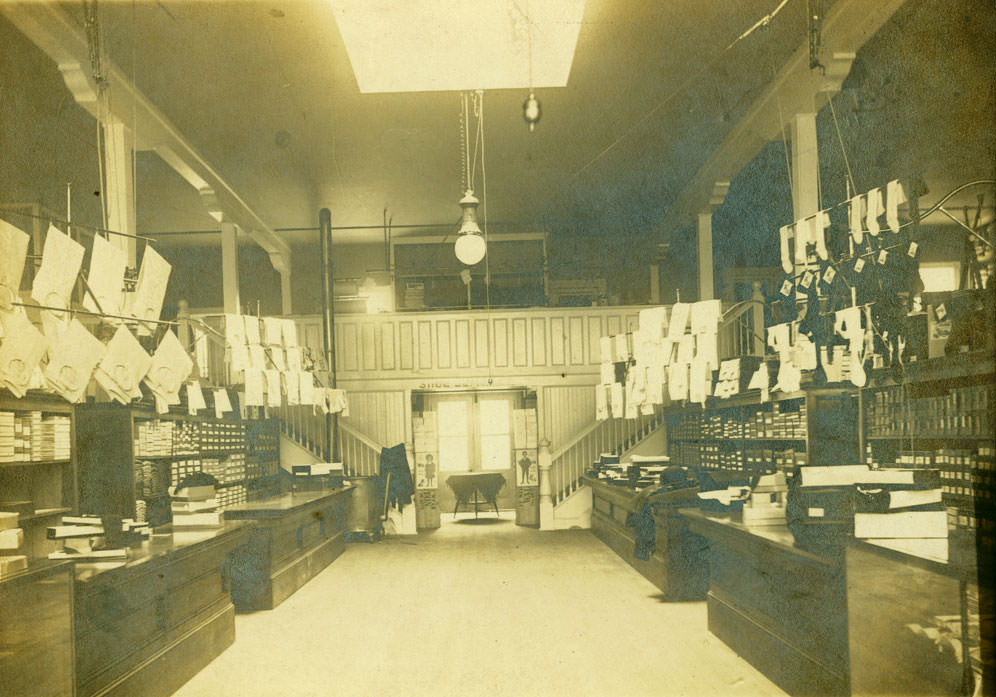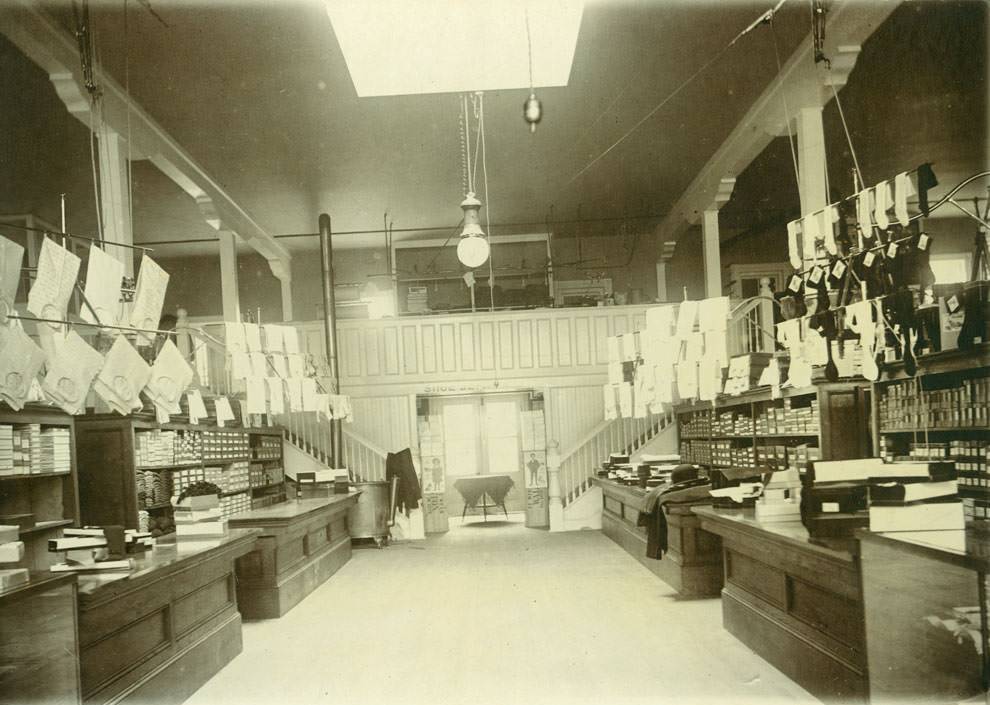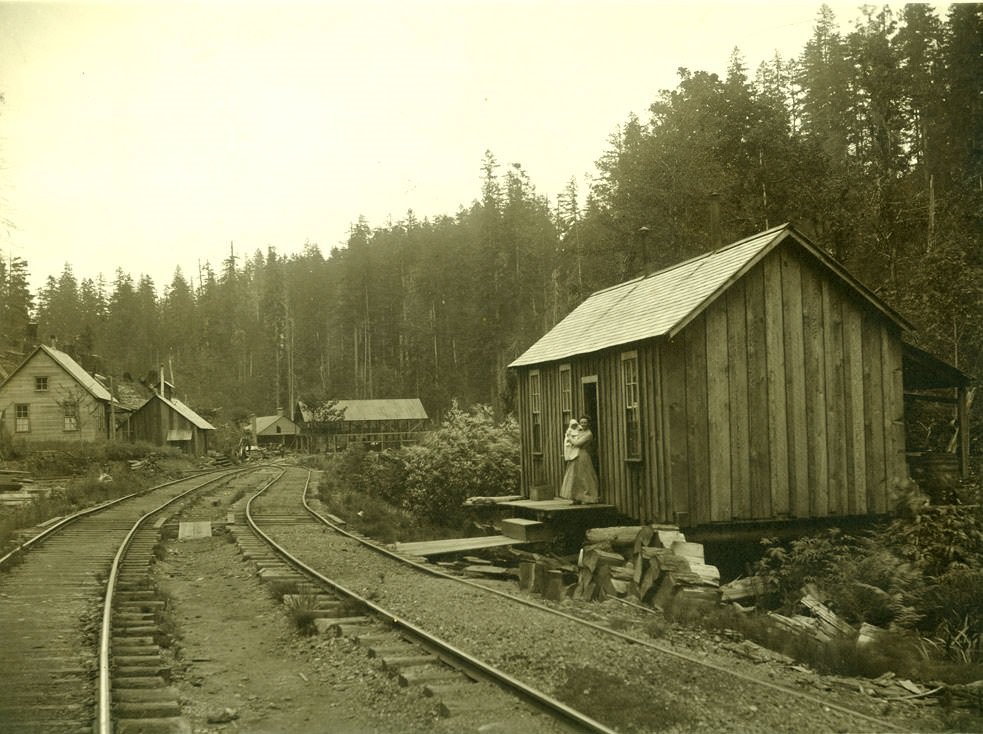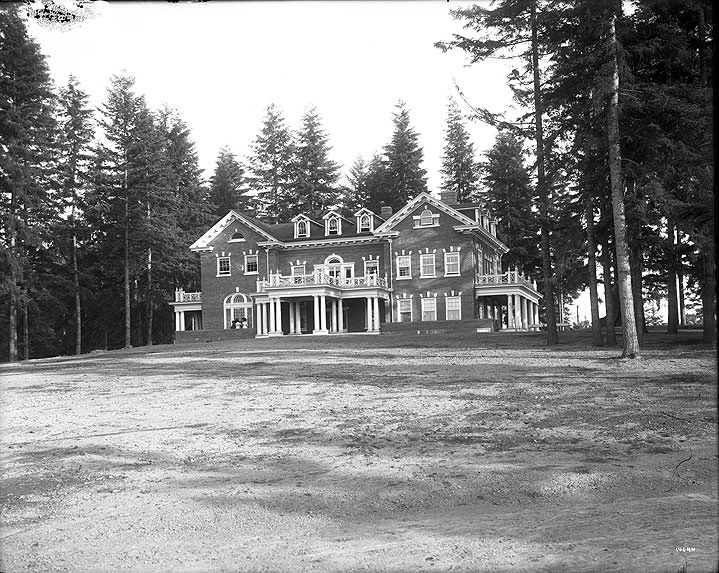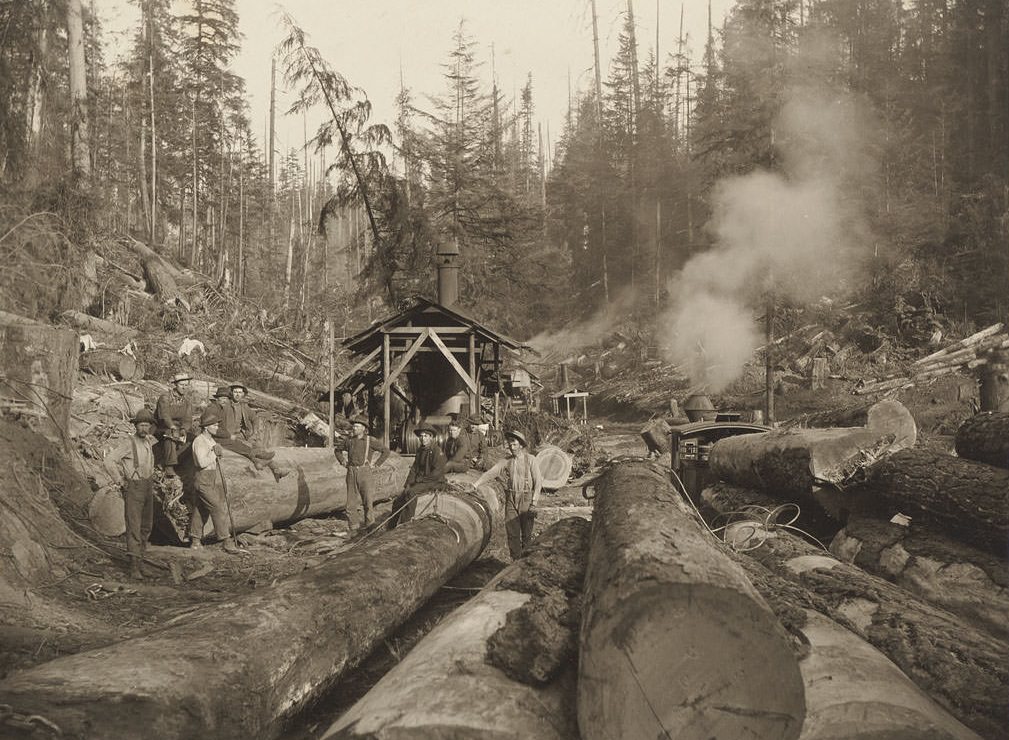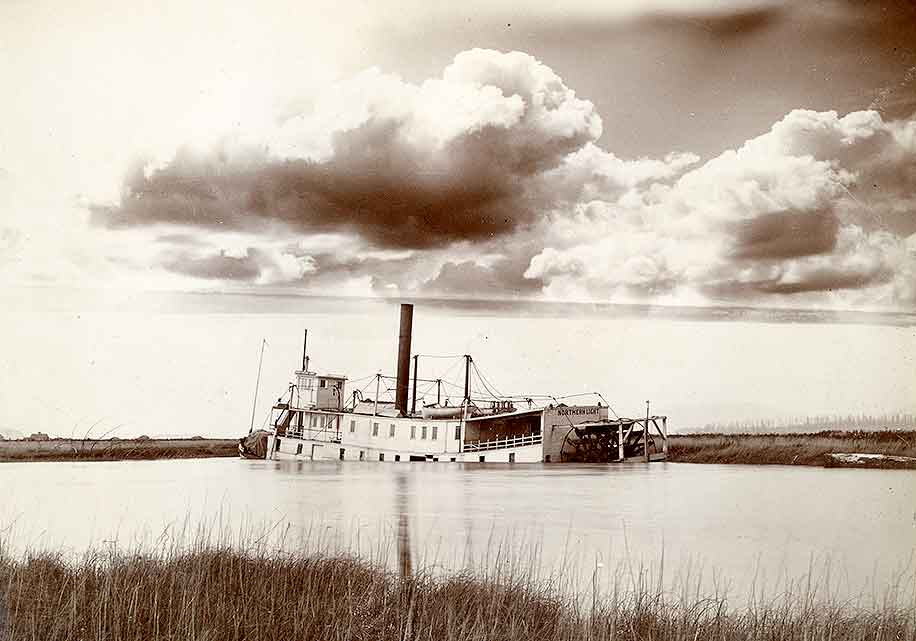Olympia’s population declined by 17% at the turn of the 20th century. The early businesses in Olympia bartered their goods since the currency was scarce, but the Bettman family and business flourished by the 1900s. As a businessman with integrity, honor, and wealth, Louis Bettman was highly regarded by the community.
In 1891, Thurston County built a grand courthouse made of Chuckanut sandstone that the state bought as its state capitol in 1901. In the meantime, the legislature met at the Farquhar Store building, the local feed store, and the armory until the newly constructed building could be ready. Olympia’s courthouse officially became Washington’s state capitol building after being purchased by the state in 1901. In 1909, Olympia changed dramatically with another dredging project, adding 29 blocks to downtown and filling in the Deschutes Waterway.
Previously we’ve shared some amazing historical photos of Olympia from the 1870s, 1880s, and 1890s. Today, we share stunning historic photos of Olympia at the turn of the 20th century.
#1 Catholic church and Providence Academy, Olympia, 1900
#2 Funeral of unclaimed dead from Spanish-American War, 1900
#3 Isaac Stevens house, Olympia, 1900
#4 Main St. looking south from 4th St., Olympia, 1903
#5 Odd Fellows Hall, Olympia, 1900
#6 Olympia, circus parade, 1905
#7 Thurston County Courthouse, Olympia, 1905
#8 Totem pole, Pioneer Place, Seattle, 1900
#9 William Winlock Miller High School, 1907
#10 Cabin, Olympia, 1902
#11 Chinese domestic worker at Turpin household in Olympia, Washington, 1900s
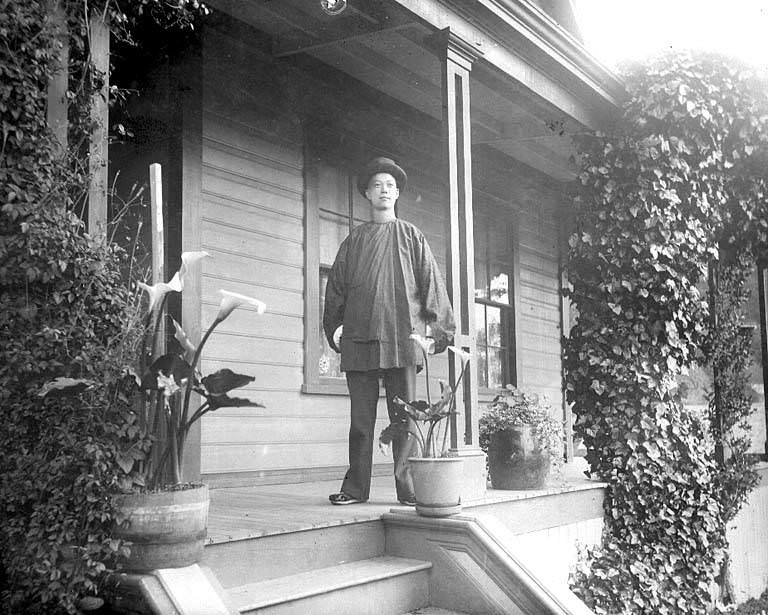
In the 1870s and 1880s Chinese men, such as the one pictured here, did domestic work in upper-class homes in Washington. However, racism and the Chinese Exclusion Act of 1882 pushed Chinese and Chinese-American domestic workers out. In Seattle, immigrant Scandinavian women moved in to fill these jobs.
#12 Drawbridge in Olympia, Washington, 1900
#13 First Washington state capitol building, Olympia, as it appeared in 1902.
#14 Masonic Temple, Olympia, 1905
#15 Muddy Main St., Olympia, with streetcar, 1902
#16 Railroad Ave., Skykomish, 1905
#17 Second and Yesler, Seattle, 1907
#18 A large two-story building, with sets of gables at roofline and a cupola, identified as the St. Michael’s convent in Olympia, 1900s
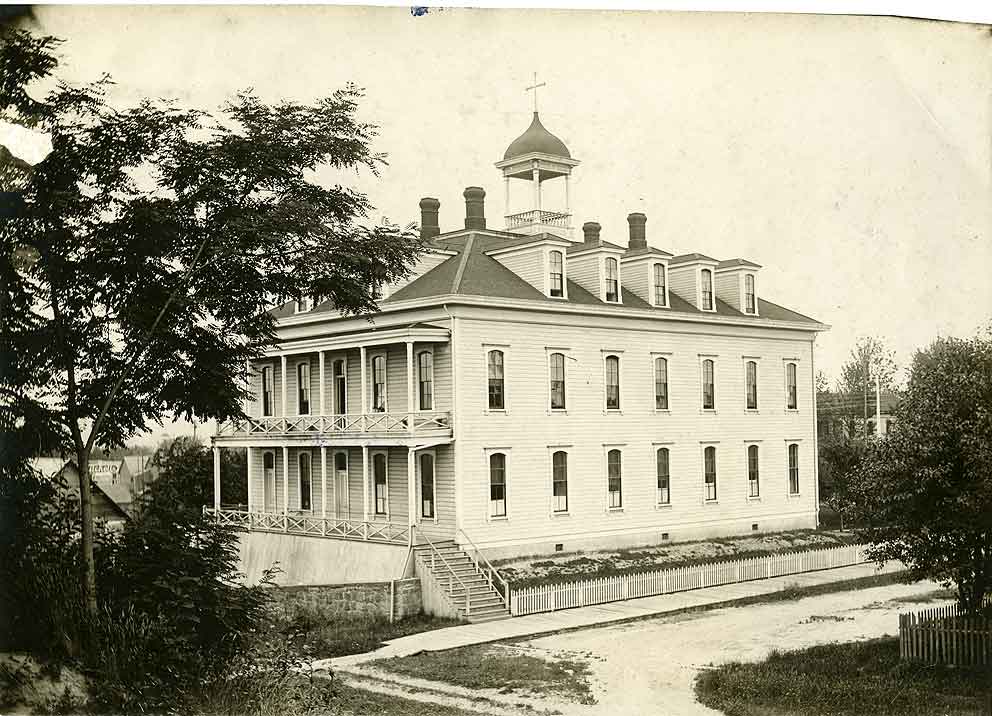
The building has a veranda on both stories of the narrow side, with a set of steps leading to the first floor. There is a picket fence running along the street side. The building is built on a slope, with a stone and concrete bulwark along the sloped edge. An unpaved street and a sidewalk run along the long edge of the building.
#19 A two-story clapboard building identified as the Daily Olympian Building, Olympia, 1900s.
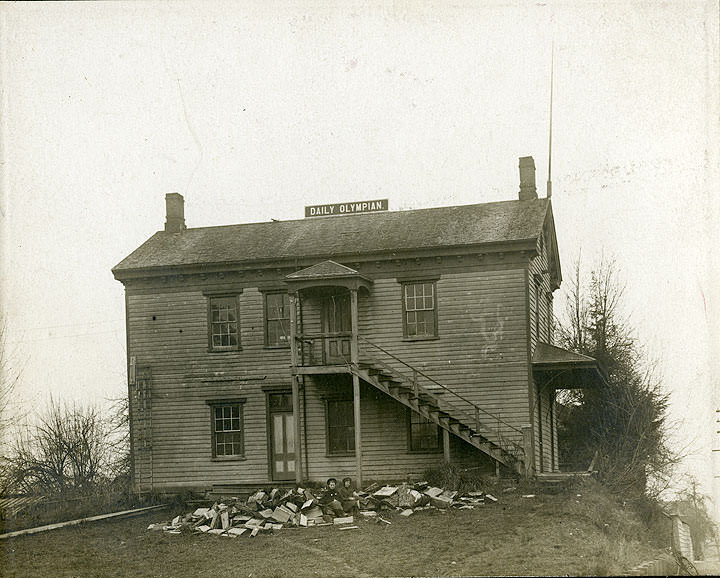
We are looking at the side of the building. There are sashed windows at both stories. A set of stairs leads to a door in the upper story. The covered entryway is to the right of the image. Atop the building is a sign reading Daily Olympian. In the yard outside the building is a pile of chopped wood. Two girls dressed in winter clothes are sitting on the wood pile. A ladder is propped against the building. Telegraph wires lead out from the building.
#20 Washington High School, Olympia, 1900s
#21 Old State Capitol building, 1900s
#22 Ray Laughton as cowboy, Olympia, 1900s
#23 Chambers Block in Olympia, 1900s
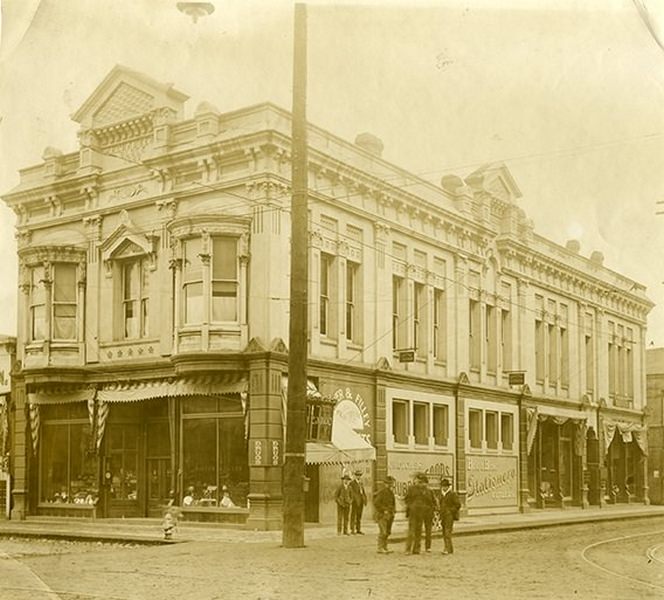
It is a tall masonry building with ornamental pediments at roofline and bay windows at second story. Below the pediment are the words A.H. Chambers Block. At ground level are retail establishment the Sawyer & Filley Drugstore. Retractable awnings are over the entrance and picture windows. At second story are two small signs reading Dr. Redpath and Dr. Ingham. The intersection in front of the building, at Main Street (now Capitol Way) and Fourth Avenue is paved. A trolley track curves around through the intersection. A group of men is standing in the street, and two other men are on the sidewalk.
#24 Doane’s Oyster House, Olympia, 1900s
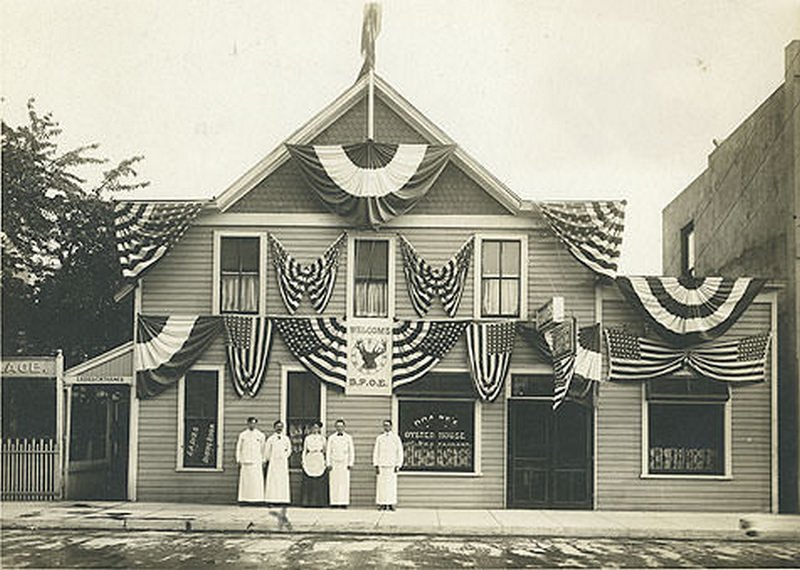
It is a two-story clapboard building with false front facing the street. Sashed windows are on both levels. Over the doorway is a sign reading Doane's Cafe. To the left of the building is an entryway to a fenced-in rear garden, with a sign over it reading Ladies Entrance. Bunting is draped across the front of the building at all levels. A banner reads Welcome B.P.O.E. Five workers stand in front of the building. Four are men wearing white jackets with long white aprons. One is a woman wearing a dark skirt and apron.
#25 High School, Olympia, 1908
#26 High School [Washington School] Olympia, 1908
#27 Olympia Hotel, 1904
#28 View of Olympia with Olympia Hotel, 1900
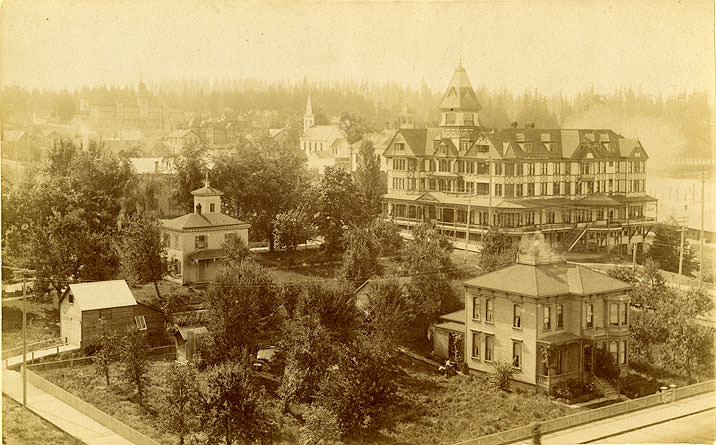
This appears to have been taken from the top of the Old State Capitol Building. In the foreground is the Isaac Harris house, with a side yard landscaped with trees and a small outbuilding. Behind it is the Italianate Sylvester mansion, with its tower. The largest building in the view is the Olympia Hotel, a very large wooden structure, in a mock-Tudor style with a turret. Beyond it can be seen the Catholic church with its steeple. In the background is the Deschutes Estuary. There are paved sidewalks running alongside the streets.
#29 Olympia Panorama, 1909
#30 Tilton Home, Olympia, 1902
#31 Fire Company, Olympia, 1900
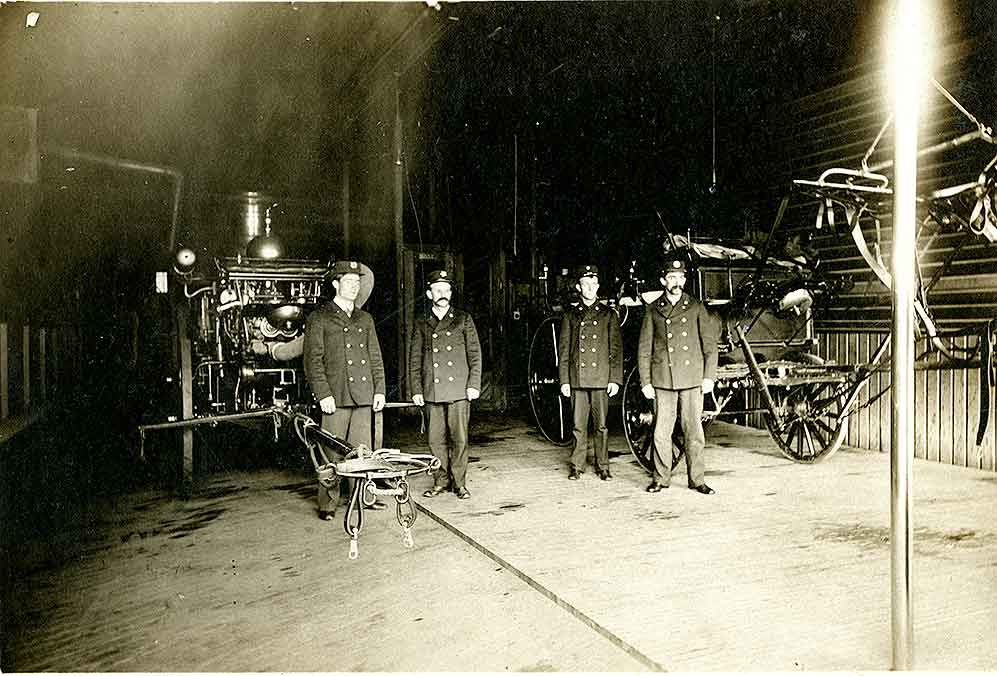
Interior of a fire company, likely the Olympia Fire Company No. 2. It is a wide room with wooden siding and a concrete floor. In the foreground is a fire pole. Four men stand in front of two fire engines. They are wearing firefighters' uniforms with double breasted jackets and caps. Two men are standing in front of each engine. The engine to the left has a water tank and a tongue extending in front of it with bridle and other gear ready to be attached to a horse. The engine to the right appears to be for transportation.
#32 Governor’s Mansion Olympia, 1910s
#33 Street Paving in Olympia, 1908
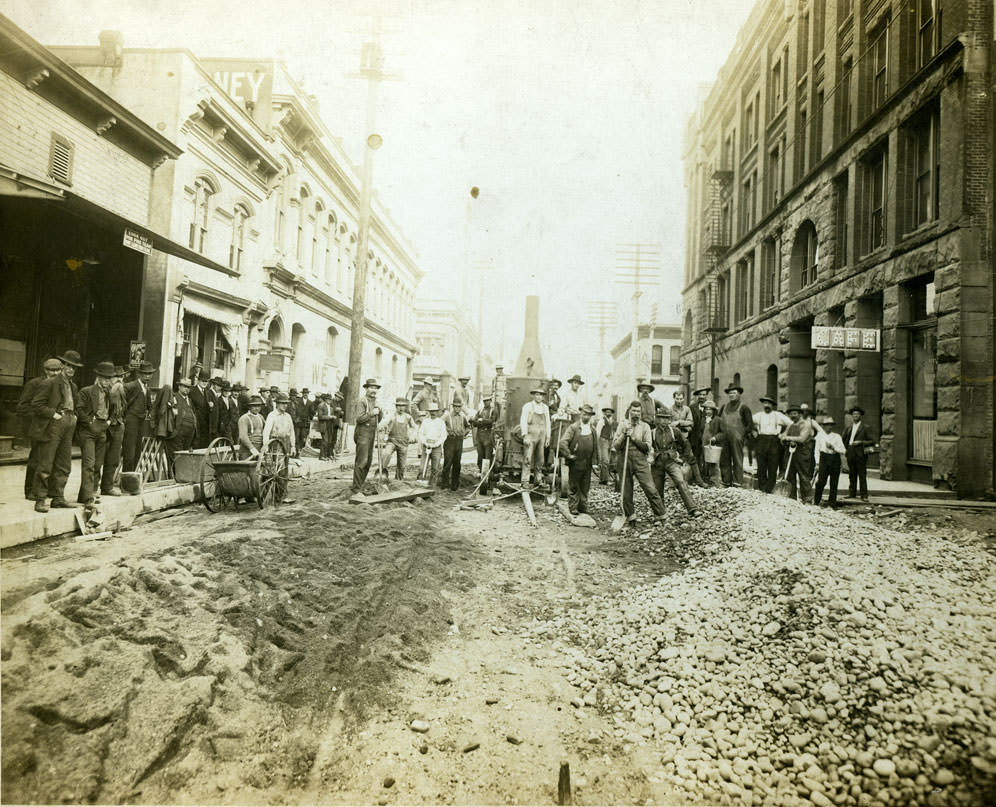
A pile of gravel is lined along the right side of the street, with sand on the left. The crew stand in the middle of the street surrounding a donkey engine, holding shovels and buckets. Spectators line the street. A wheelbarrow or cement hopper with large wheels is in front of the sidewalk, with two men standing by it. A four-story sandstone building is on the right side of the street, with a sign reading Cafe, and Kneeland Restaurant and Cafe; other businesses line the left side of the street, including a saloon with an Olympia Beer sign.
#34 Olympia Police Department, 1905
#35 Olympia Police Department, 1905
#36 Olympia Panorama, 1909
#37 Women’s Club, Olympia, 1908
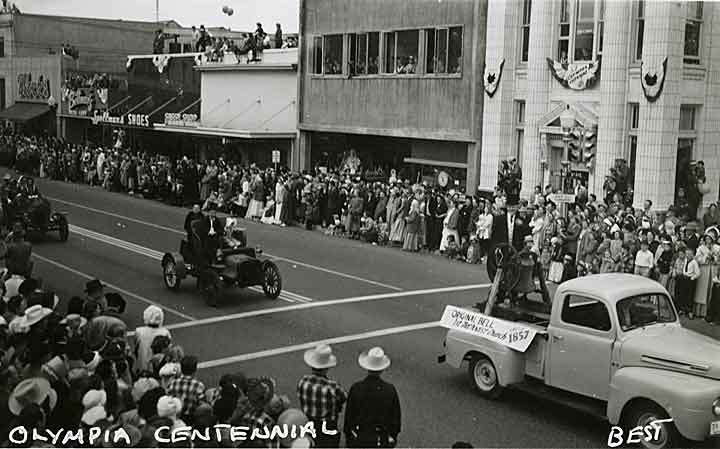
There is a front porch with four columns supporting an upper balcony. The building has clapboard siding on the lower level and shingles on the upper level. There is a gable. A wooden sidewalk runs along the front of the building, and a narrow unpaved street running at an angle, with another wooden sidewalk in the foreground. There are two utility poles at the left side of the image.
#38 First Presbyterian Church, Olympia, 1909
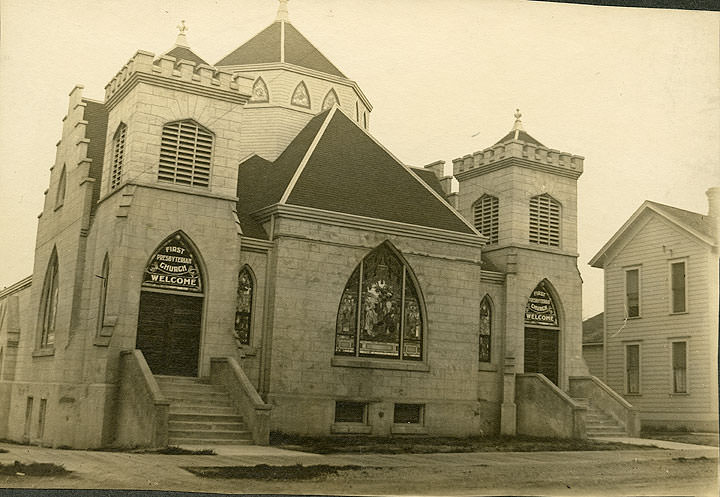
It is an elaborate brick building with twin towers flanking a cross-shaped building, and an octagonal cupola at the center. There is an arch-shaped stained-glass window facing the street [this Tiffany window was moved to the current location of the successor United Churches of Olympia at 11th Avenue]. This building was located at 602 Franklin Street. A two-story residence, the manse, is at the right.
#39 Main Street and 6th, Olympia, 1905
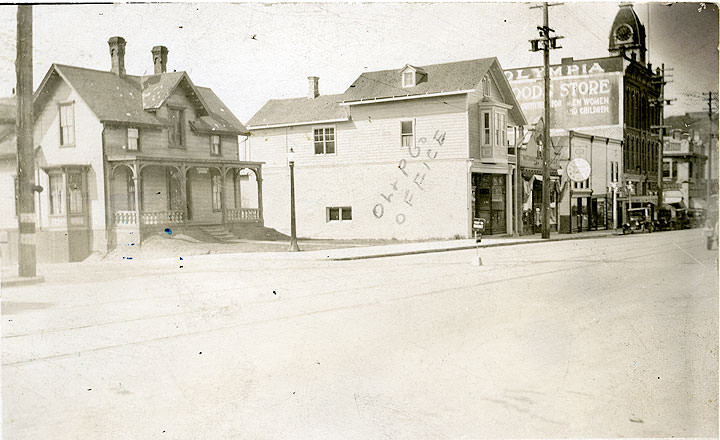
In the foreground is the wide Main Street, with trolley tracks going up its center. Across the street is a two-story Gothic Revial style house, the home of Peterfield Turpin, early pioneer. To its right is the office of Olympia Power and Light, a two-story building with a bay window at second level. Next to it are two one-story commercial buildings, and then the two-story Odd Fellows building with its clock tower. Automobiles are parked along the side of the street in front of the Odd Fellows building.
#40 Olympia Brewing Company, 1909
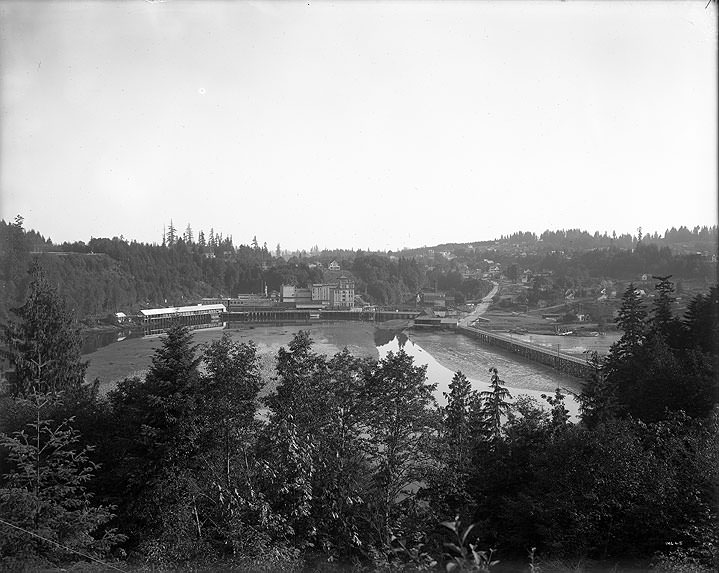
In the foreground is a stand of trees. Behind it is the Deschutes River estuary, at low tide. A bridge crosses the estuary to the right, with a road leading up from the bridge. Center field is taken up with the brewery buildings and operation. The tall brick main brewery building is in the center. Off to its left is a series of long, low buildings. Above the brewery building is the Schmidt Mansion. Other residential structures dot the hillside above and to the right of the brewery.
#41 Olympia Street Scene, 1906
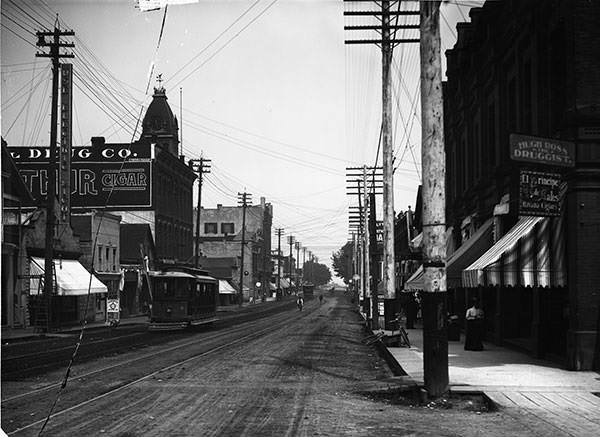
Two streetcars are in background. Signs in image left include vertical neon: Use Electric Light. At corner of a sign painted on a building: Foster & Kleiser. Sign at right edge of image: Hugh Ross the Druggist. [NOTE: a patron has identified this site as the northeast corner of 6th Avenue (now Legion Way) and Main Street (now Capitol Way), looking north along Main Street]. Asahel Curtis
#42 Street paving in Downtown Olympia, 1908
#43 Lower Main Street, Olympia, 1902
#44 Fourth St. Olympia, 1906
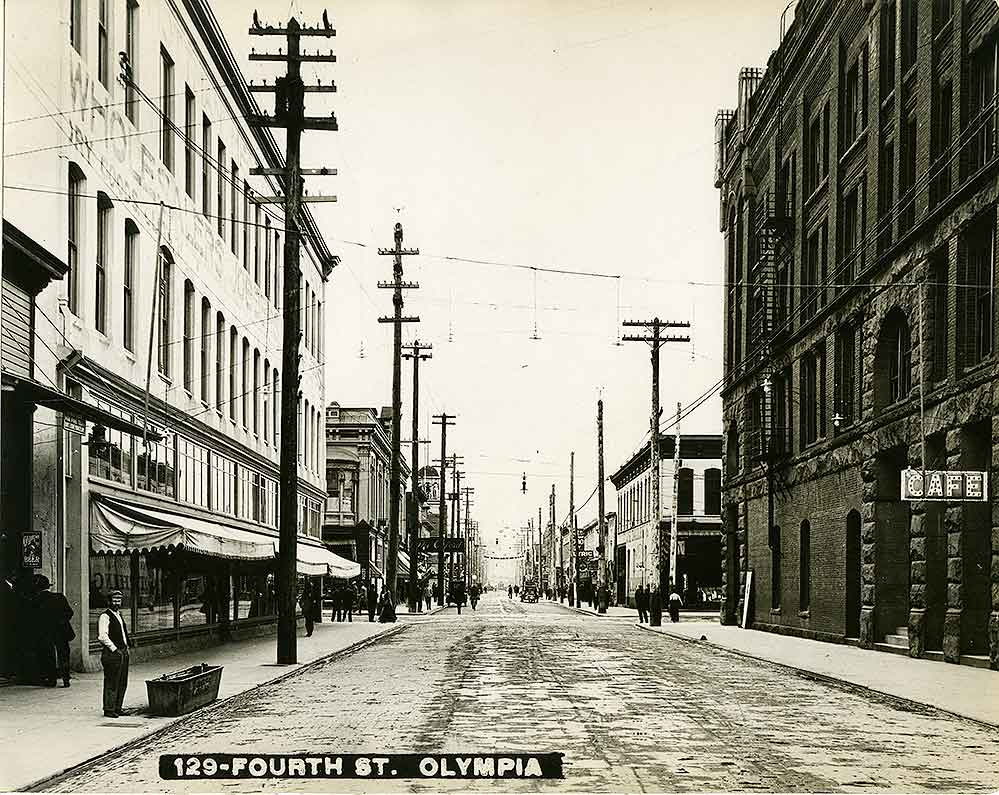
The street is paved with bricks. One block further down, trolley tracks enter the street and extend down the middle. A trolley car can be seen in the distance. Utility poles line both sides of the street. Commercial establishments are on both sides, including the Mottman Building, the Chambers Block and the Oxford Hotel. A clapboard building with bell tower, the Columbia Hall, is about halfway down on the left. A banner across the street in the distance says Great Sacrifice Sale Fri. May 18, 10 AM. One automobile is parked on the side, and another is making its way down the street. Several pedestrians, both women and men, are on the sidewalks.
#45 Olympia, Lower Main Street, 1902
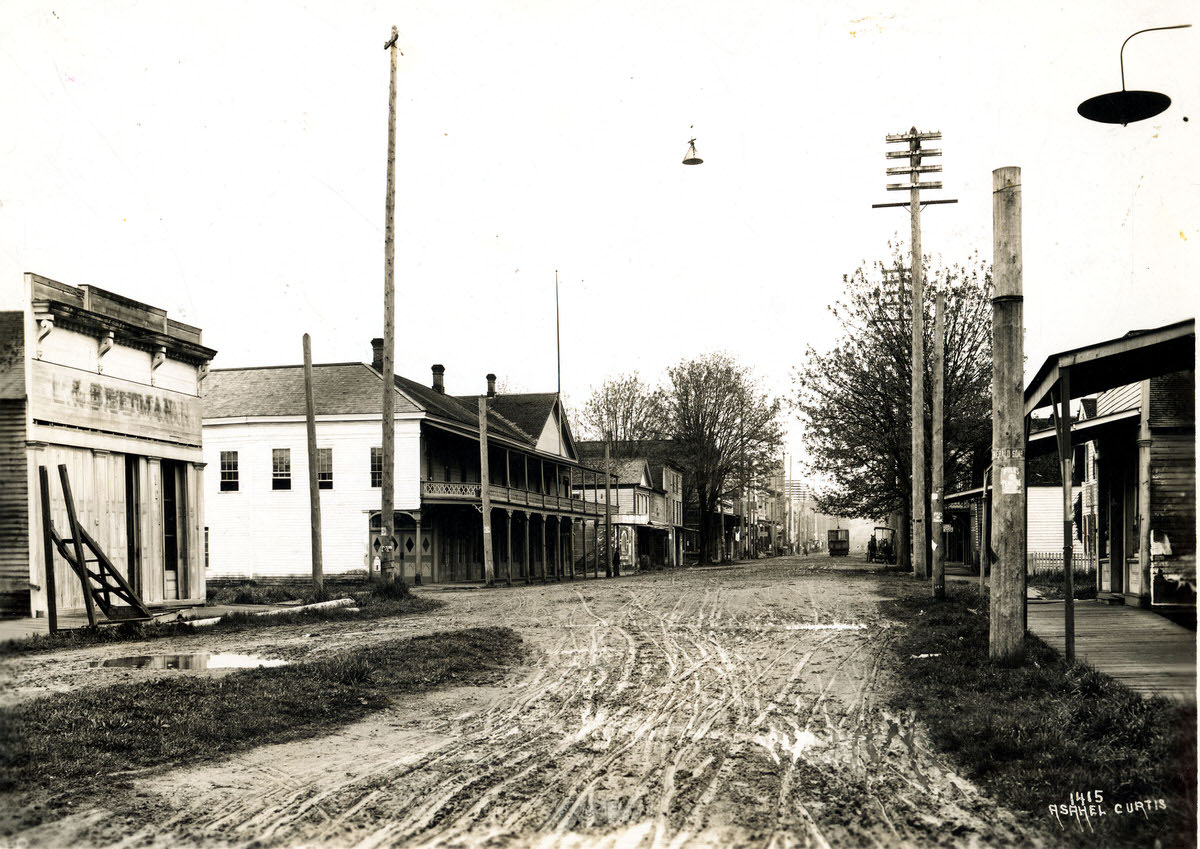
The street is wide, unpaved and muddy, with wheel tracks etched into the mud. Storefronts line both sides of the street, including the Bettman store, a one-story clapboard building with a false front and the words LA. Bettman painted on the front; a two-story building with a balcony on second floor, and several other buildings. There is a boardwalk sidewalk along the right side of the street. In the far distance can be seen a vehicle, possibly a trolley, running along the street, and a cart with horse parked along the side There are utility poles and street lights running along the streets.
#46 East Fourth St. Olympia looking west, 1906
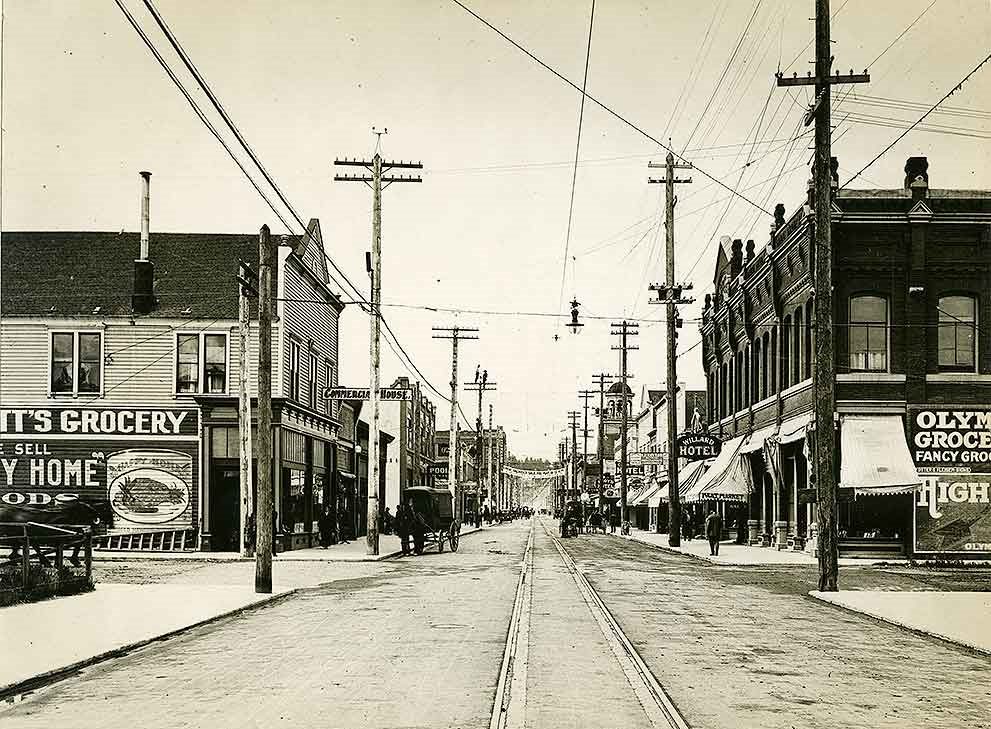
The street is paved, and trolley tracks are extending down the middle. Utility poles line both sides of the street. Commercial establishments are on both sides, including the Commercial House, the Willard Hotel, the Olympic Hotel, the Carlton Hotel, and Taylor's Music Shop. A clapboard building with bell tower, Columbia Hall, is visible about halfway down the street.
#47 Group of Olympia Hunters, 1908
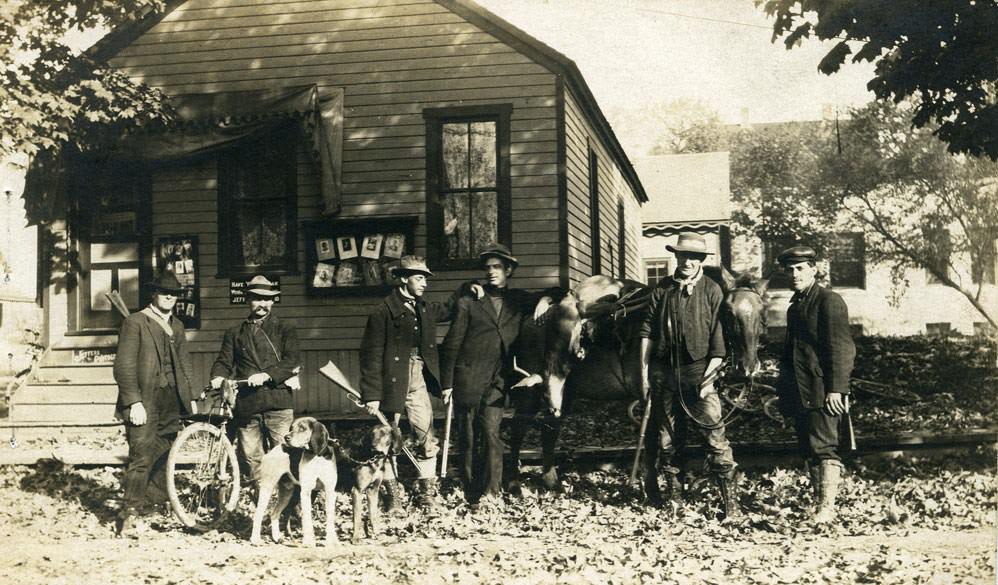
Three of the men hold rifles and a fourth has a rifle over his shoulder. One man has a bicycle and 2 dogs. One man holds the reins to a horse which has a deer on its back. There are 2 cases with photographs on the side of the building A small sign on the building advertises the Jeffers Studio.
#48 Olympia Brewing Company brewhouse, first day railroad arrived, 1906
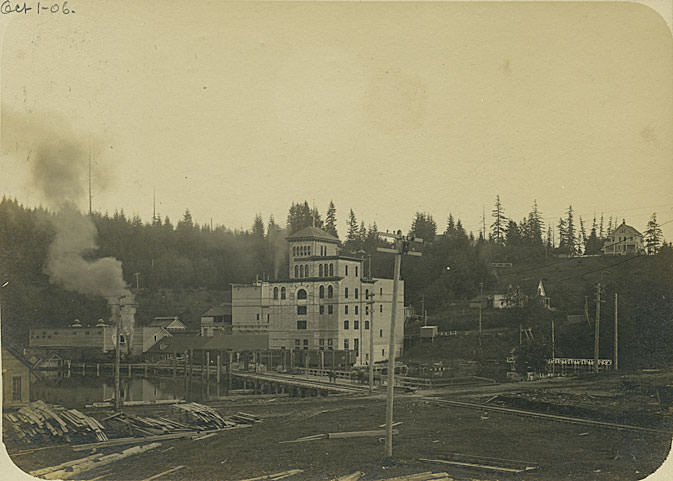
In the foreground is a lumber yard. Building materials are stacked at its edge. A narrow-gauge railroad track from it and across a railroad bridge over the Deschutes Estuary. Several figures are standing on a bridge. Behind them is the multi-story brick brewhouse, with a tower surmounted by roof cap. Additional commercial buildings are to the left of the large brewhouse. A steam locomotive is approaching the brewery, with steam billowing from its stack. Additional railroad cars are parked alongside the brewery. A hillside rises behind the brewhouse. The Schmidt Mansion sits on its own at the top of the hill. Inscription notes that the photograph was taken on the first day that the railroad arrived at the brewery.
#49 Soldiers Burial Day, Spanish American War, Olympia, 1900
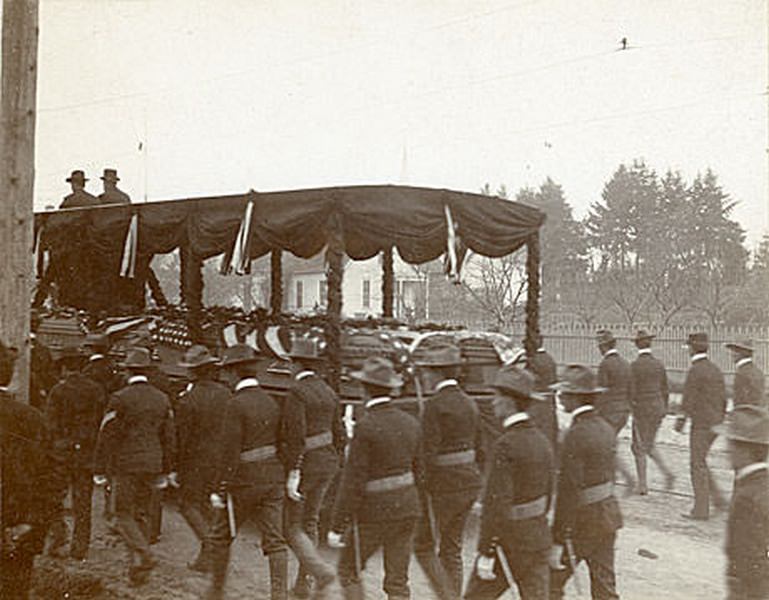
To the side of the open sided hearse is a double line of soldiers wearing white gloves. There is a large house in the background, with a picket fence. Trolley tracks run along the wide street. Olympia had the honor of burying several bodies of Spanish American war soldiers whose bodies were not otherwise claimed.
#50 The 50th anniversary of the Masonic lodge, Olympia, 1902
#51 50th anniversary of the Masonic lodge, Olympia, 1902
#52 Gold Bar Restaurant in ruins, Olympia, 1902
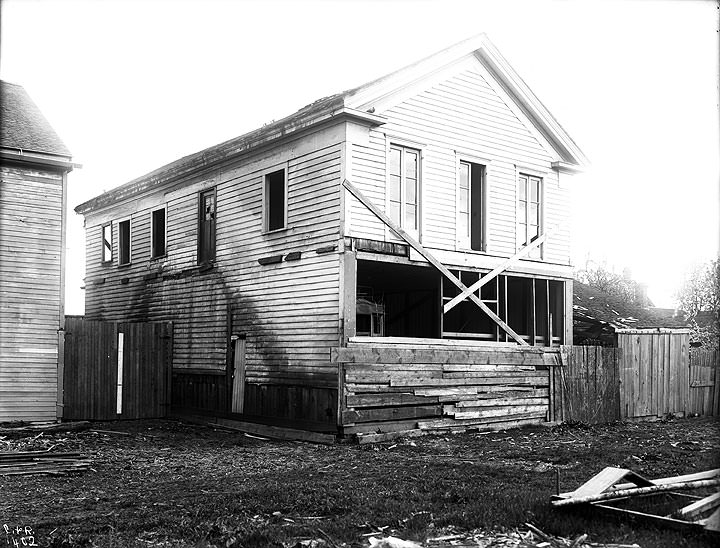
This was the home of the first territorial legislature, located on what is now Capitol Way between State Avenue and Olympia Avenue. The building is a two-story clapboard-sided building with storefront windows. The glass has mostly been knocked out of the building. The ground floor front is partly boarded up. A shed can be seen to the right of the building, and the corner of another building to its left. It sits on a dirt street. Debris lies on the street. Asahel Curtis and Romans
#53 Harris Dry Goods Store, Olympia, 1906
#54 Men’s Department, Harris Dry Goods Store, 1906
#55 Two long canoes racing in the Deschutes Estuary, Olympia, 1905
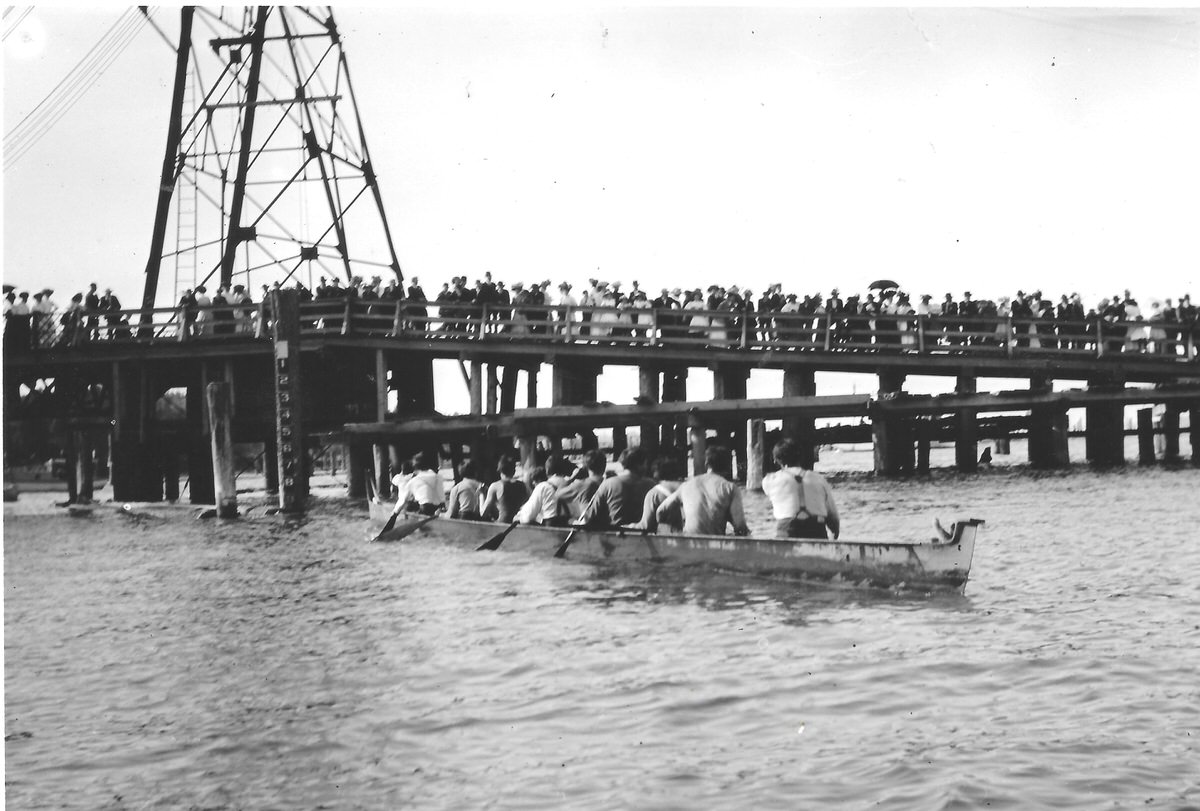
According to accompanying narrative, we are looking toward downtown Olympia from the Fourth Avenue Bridge. Two canoes are racing, each one with eleven paddlers. A small steamer is observing the race. In the distance we can see the wooded Capitol Hill and the railroad bridge across the Deschutes Estuary. We can just make out the old Territorial Capitol hidden among the trees, St. Peter's Hospital, Providence Academy, and the steeple of First Congregational Church. A beach is along the bank, with pilings extending into the estuary.
#56 Mason Co. Logging Co. Camp No.2 1903 Bordeaux, 1903
#57 Governor’s Mansion, Olympia, 1909
#58 Mason Co. Logging Co. Black Hills, 16 miles west of Olympia, 1903
#59 Old State Capitol Building, Olympia, 1903
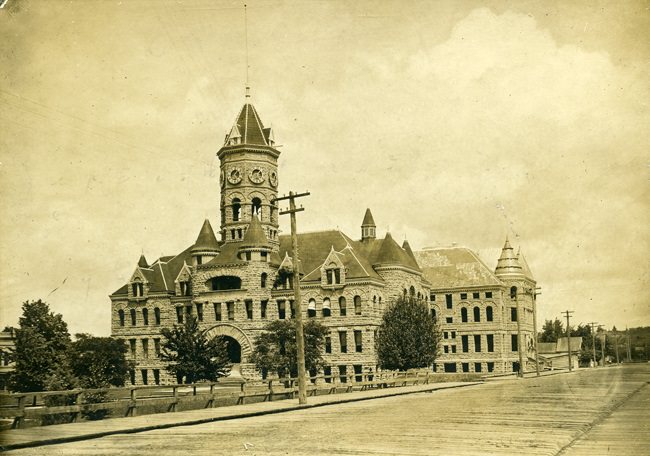
It is a multi-story building with turrets and a clock tower. To the rear of the building, we can see the annex that was built to accommodate the legislature, under construction; its window panes have not yet been inserted. In the foreground are Sylvester Park and the planked 7th Avenue which covers the Seventh Avenue Tunnel.
#60 Johnstone house, 902 Fifth Street, Olympia, 1900
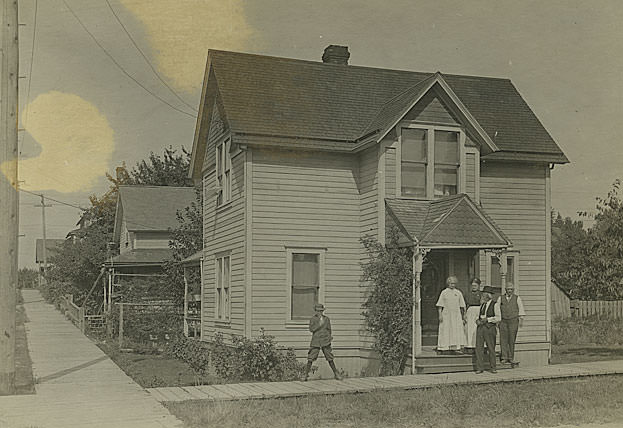
The second story has a gable, and there is a covered entry way. Four people stand at the entrance, a middle-aged man and woman, and an older man and woman. A boy in knickers stands on the wooden sidewalk that extends in front of the house. A paved sidewalk runs along the side of the home.
#61 Isaac Stevens House, 1902
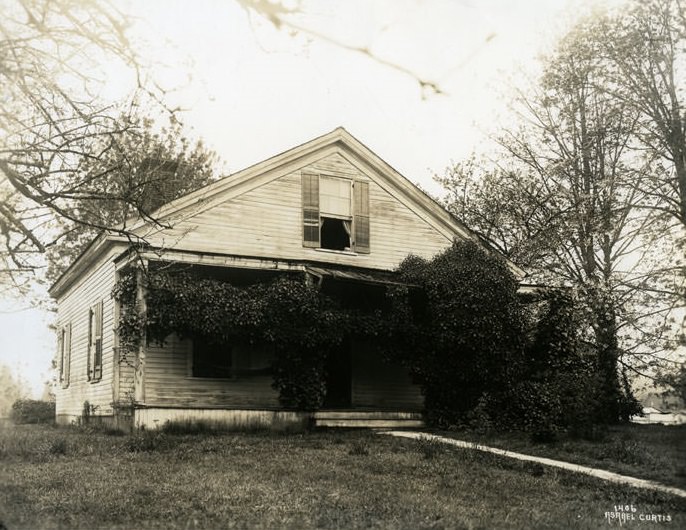
Photograph of an abandoned house, identified as the Isaac Stevens House (Governor's Mansion), Olympia, WA, Thurston County. It is a 1 1/2 story clapboard home with a single sashed window at upper level and three sashed windows at lower. A front porch is supported by three slender columns. Overgrown vines obscure most of the porch and entryway. (This house was the first territorial governor's mansion, built in the 1850s and razed in the 1920s).
#62 Soldiers Burial Day, Olympia, 1900
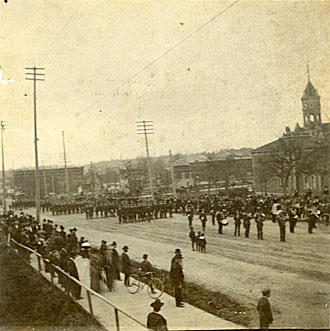
A parade is progressing up Main Street (Capitol Way). In the foreground left, a wide sidewalk is full of spectators. There is a large house in the background, identified as the Isaac Harris House. The Old State Capitol Building can also be seen with its clock tower. Trolley tracks run along the wide street.
#63 Breaking Ground for Annex to Old State Capitol Building. 1901
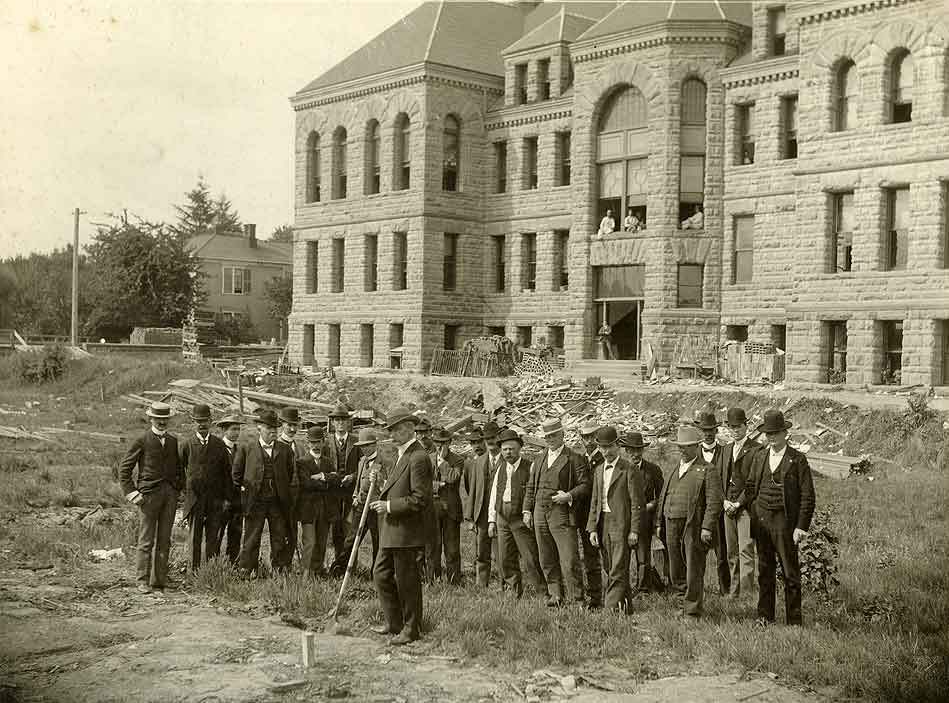
A man in the foreground, identified as Governor John R. Rogers, is holding a shovel. A group of men are standing behind him. Construction debris and material is strewn on the site behind them. A few men are standing or sitting in the windows and doorways of the Old State Capitol Building.
#64 Tenino Street Scene, Olympia, 1909
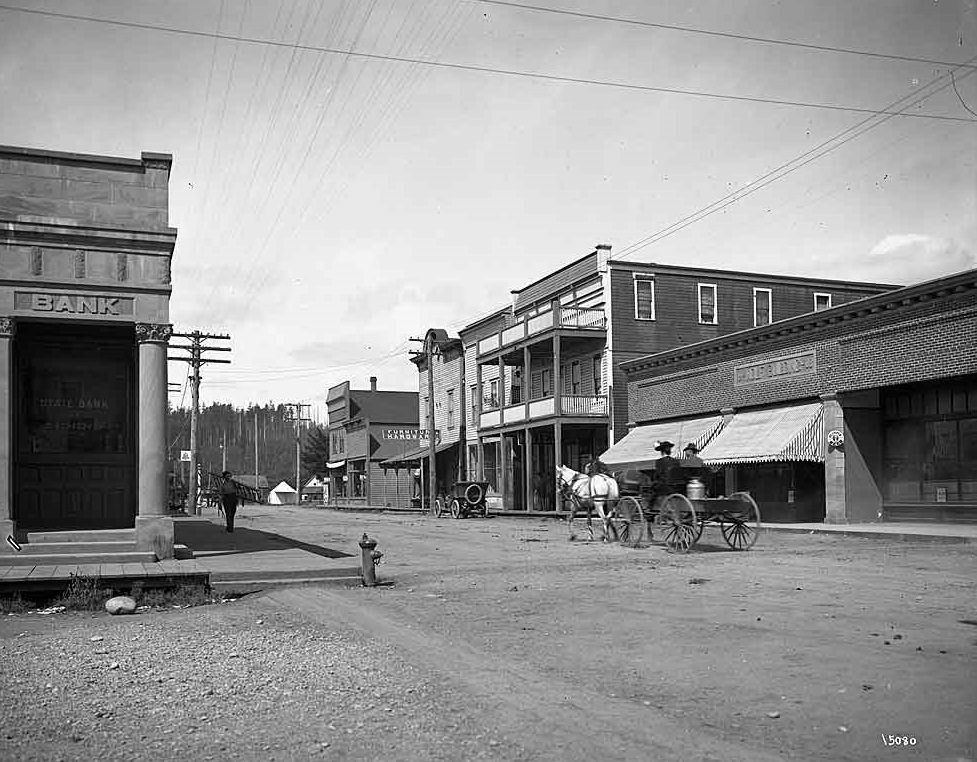
From left to right, the Tenino State Bank, with a fire hydrant at sidewalk corner; an automobile parked near a store with sign: Furniture, Hardware; a man and woman, viewed from rear, riding in a horse drawn wagon with a milk can in the back; the one-story Wolf Building, with a small sign for Olympia Beer. Asahel Curtis
#65 St. Michael’s convent in Olympia, 1900s
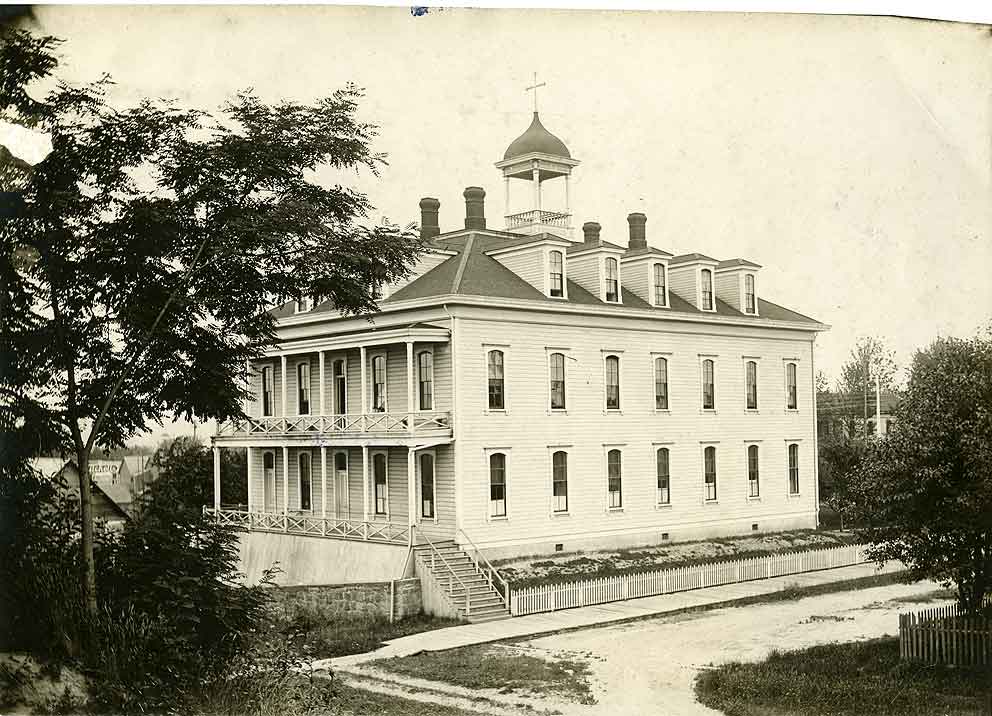
The building has a veranda on both stories of the narrow side, with a set of steps leading to the first floor. There is a picket fence running along the street side. The building is built on a slope, with a stone and concrete bulwark along the sloped edge. An unpaved street and a sidewalk run along the long edge of the building.
#66 Isaac Stevens House, Olympia, 1902
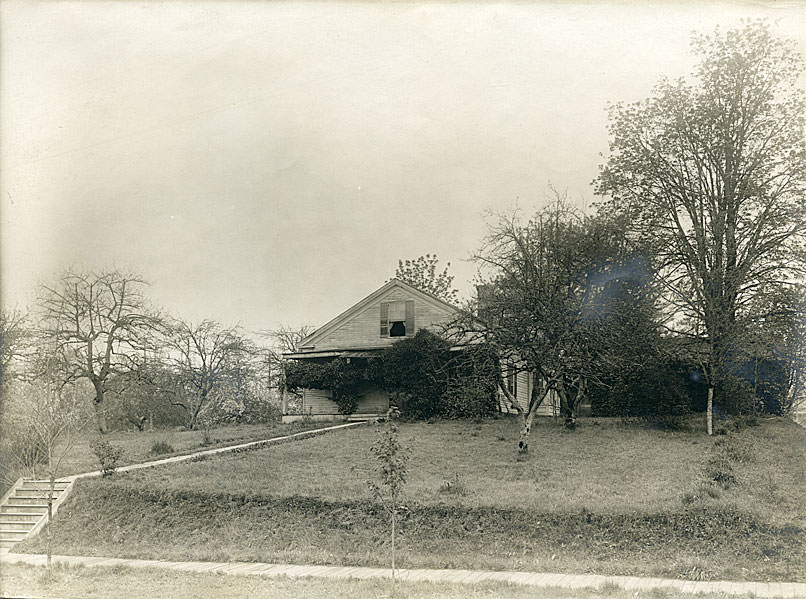
It is a 1 1/2 story clapboard home with a single sashed window at upper level and three sashed windows at lower. A front porch is supported by three slender columns. Overgrown vines obscure most of the porch and entryway. In the foreground is an unkempt lawn, a set of steps leading down to a sidewalk.
#67 Robert and Abbie Stuart house, Olympia, 1900
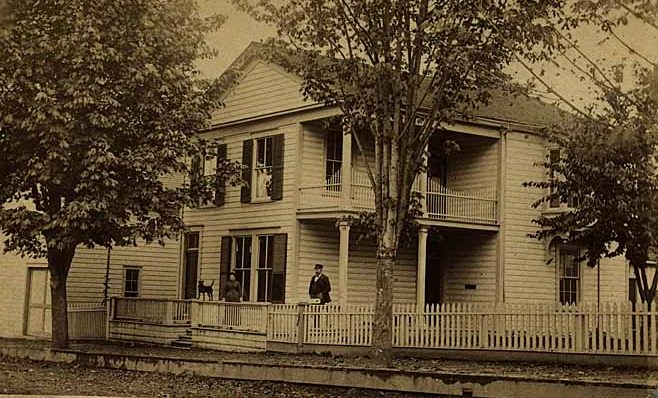
It is a two-story clapboard building with shuttered windows at both levels, and columned porches at both levels. In front of the house is a white picket fence. An outbuilding is visible to the side, and there are mature trees in front. Standing in front of the house are a woman in a dark dress and a man in a naval-style cap, identified as Robert and Abbie Stuart.
#68 The Price Company in Olympia’s first automobiles, Olympia, 1907
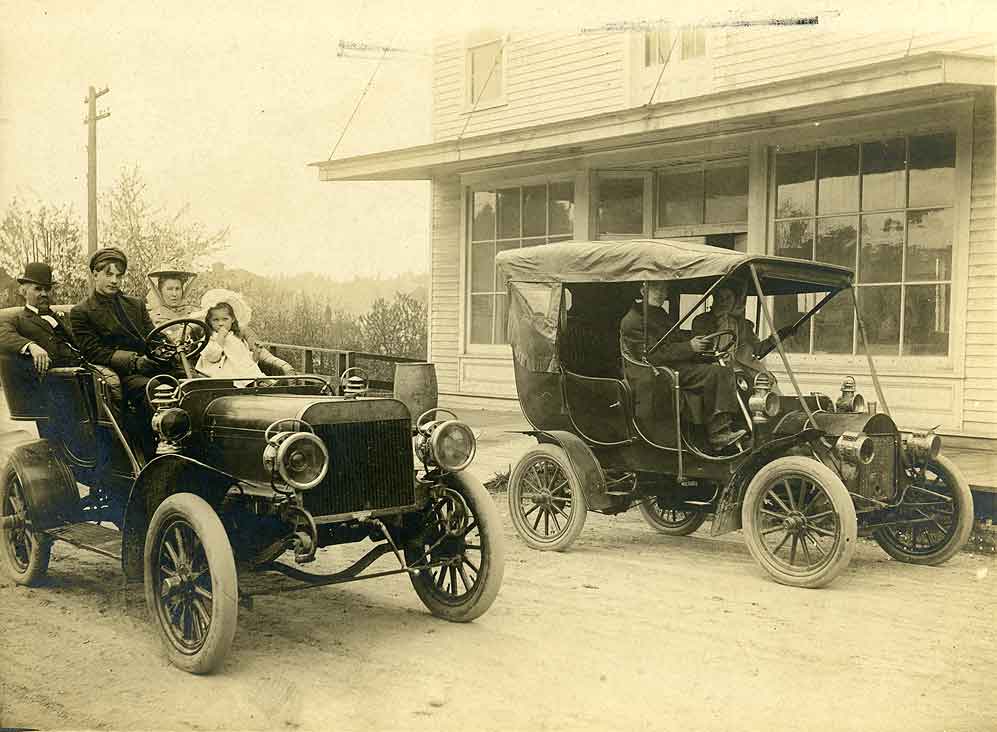
The automobile on the left, an REO or Red Wing, is open topped. A young man in a cap is at the wheel (on the right side), with a little girl next to him. An elderly couple is in the rear seat. The automobile on the right, a Winton Six, has its top up. A couple is in the front seat. To their rear is a storefront with a fixed awning and sidewalk.
#69 The Wreck of the “Northern Light”, 1903
#70 Gold Bar Restaurant, Olympia, 1900
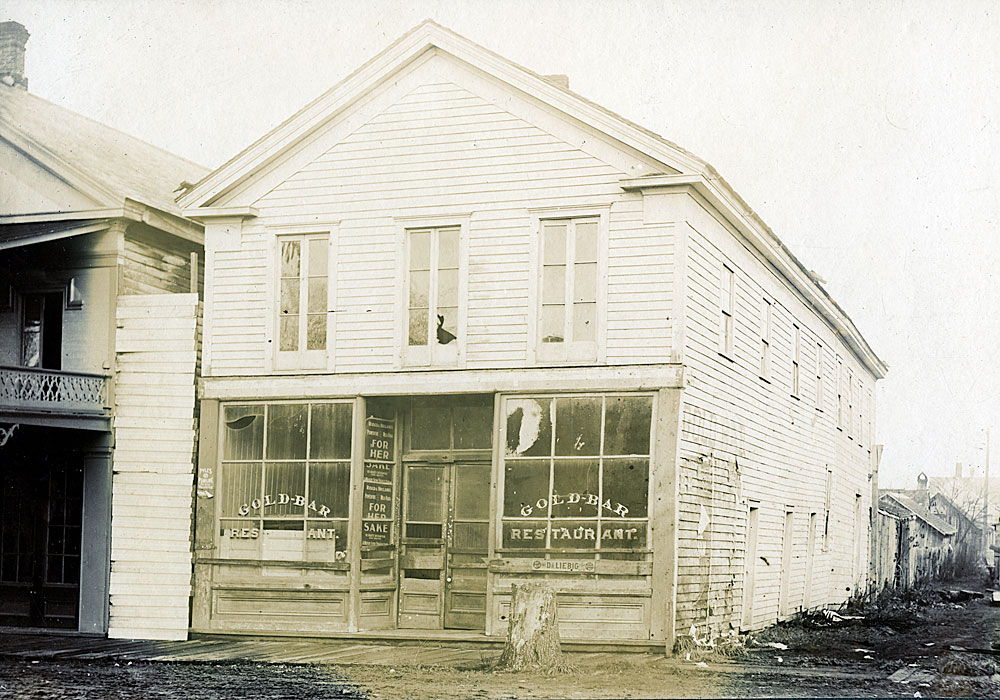
It is a two story clapboard sided building. On the ground floor are picture windows flanking a central doorway. Above are tall sashed windows. To the right of the building is an alleyway and to the left is the corner of a two-story structure with a balcony at upper level, the New England Hotel (also known as Young's Hotel and the Galliher Hotel). This building was erected in 1853 as a single-story structure by Parker and Coulter merchants, with the second story added later.
#71 Pacific House, Olympia, 1902
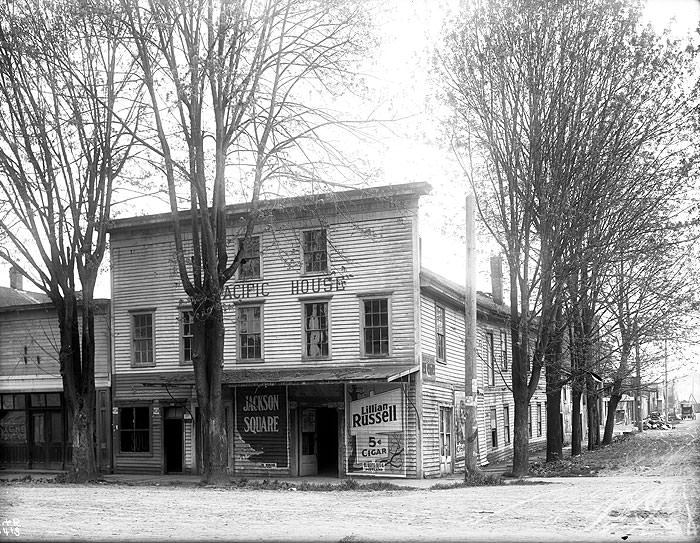
A fixed wooden awning hangs over the ground level, which has two doors. Sashed windows are at the second story and at the gable. Painted signs on the ground level advertise Jackson Square and Lillian Russell. The words Pacific House are painted on the clapboard siding. Tall trees are in front and on the side of the house. At the time this photograph was taken, the Pacific House was in disrepair or closed.
#72 Seeing Shelton, Olympia, 1908
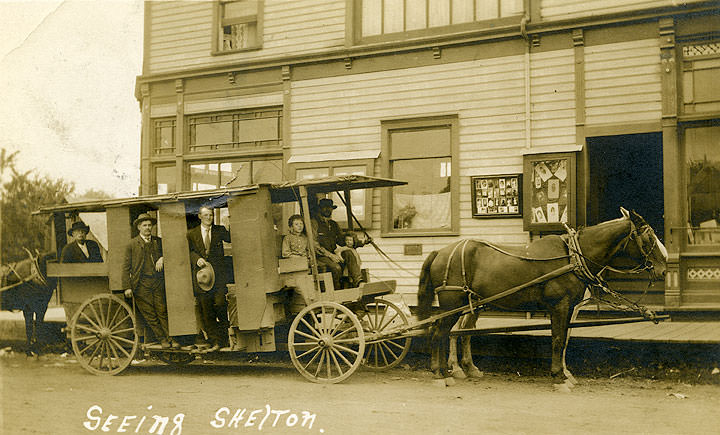
vehicle has a roof, and partially covered sides. A small child peers over the driver's knee, and an older boy sits on the seat beside the driver. Two men wearing suits are standing, posing on the side of the vehicle and one man sits in the rear. Photographs are displayed in 2 glass front display cases on the side of the building behind the vehicle. Canceled stamp and personal message to Mrs. D.N. Whipple, Olympia, Wash on reverse.
#73 Territorial Capitol, Olympia, 1902
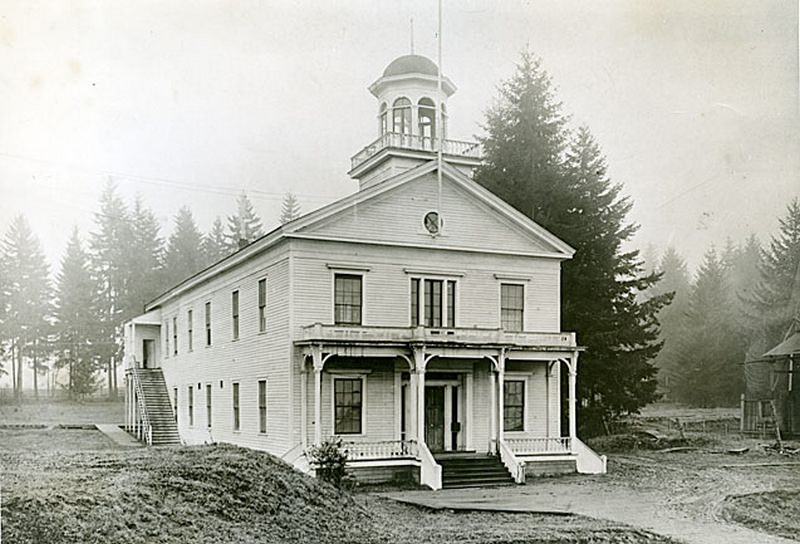
It is a two-story building with sashed windows along two visible sides, a doorway flanked by window lights. A porch runs the front of the building and there is a set of steps leading to the ground level. A cupola is atop the building with windows on all sides, and surrounded by a narrow walkway. A flagpole rises vertically from the cornice above the second story. A graded path leads up to the building which is slightly higher than grade. Grass is on the left side of the building, with evergreen trees behind and to the side of it. In the foreground is a hole and a mound of dirt behind it. This is the remnant of the aborted effort to replace the territorial capitol with a new state capitol building, vetoed by Governor John Rogers.
#74 Frank Guslander Mill, Black Lake, Olympia, 1909
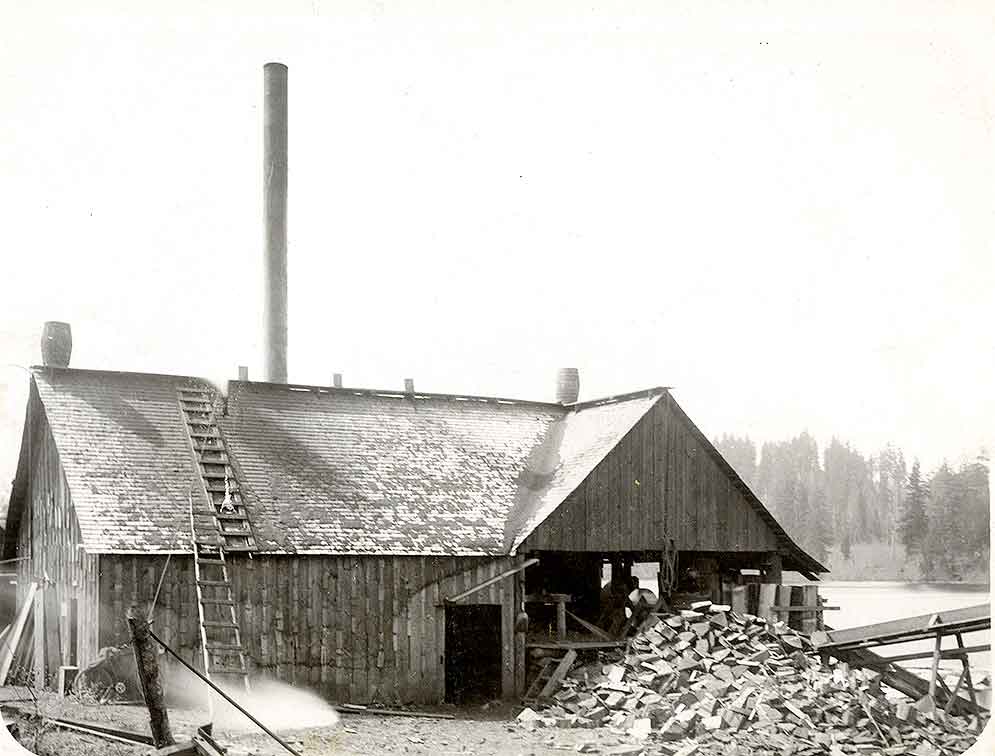
The building is one story with a pitched roof and vertical siding. A wide bay door is on the right side of the building, and there is a pile of pieces of shingles and other lumber scraps outside of it. A chute runs from the pile to a point off the edge of the photo. A ladder is leaning against the building, with another ladder affixed to the roof. A tall smokestack rises from the rear of the building. A shovel and a peavey are hanging from the side. Two barrels are sitting on top of the roof (perhaps in case of fire) Smoke is coming out of a small stovepipe near the roofline.
#75 Soldiers Burial Day, Spanish American War, Olympia, 1900
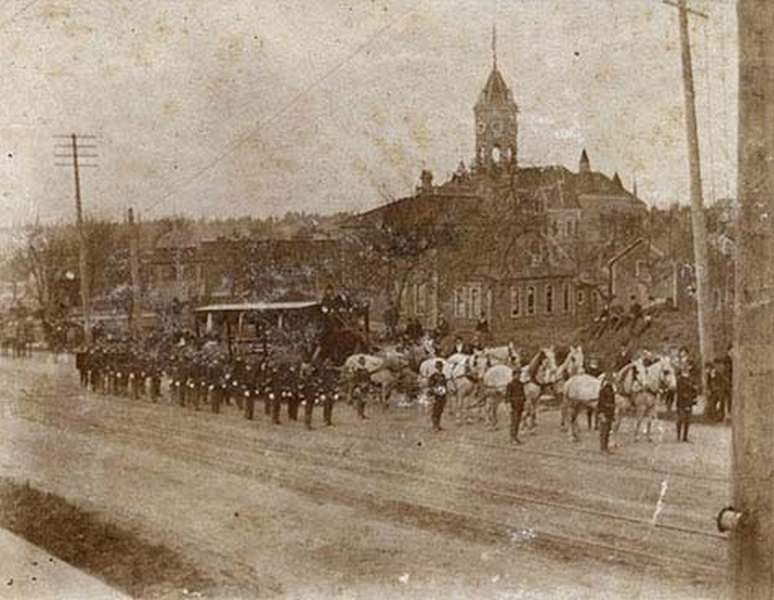
Eight white horses are pulling a very long, open sided hearse, proceeding up Main Street (now Capitol Way). Two men, identified as teamster H.F. Docherty and A.E. Laberee livery owner, sit high up on the hearse, holding the reins. To the side of the hearse is a double line of soldiers wearing white gloves. Soldiers also stand next to each pair of horses. There is a large house in the background, identified as the Isaac Harris House. The Old State Capitol Building can also be seen with its clock tower, as well as the Sylvester Park bandstand. Trolley tracks run along the wide street. (Note this is the same event as image C1945.141.2, taken a few minutes later)
#76 Rosenthal store, Olympia, 1902
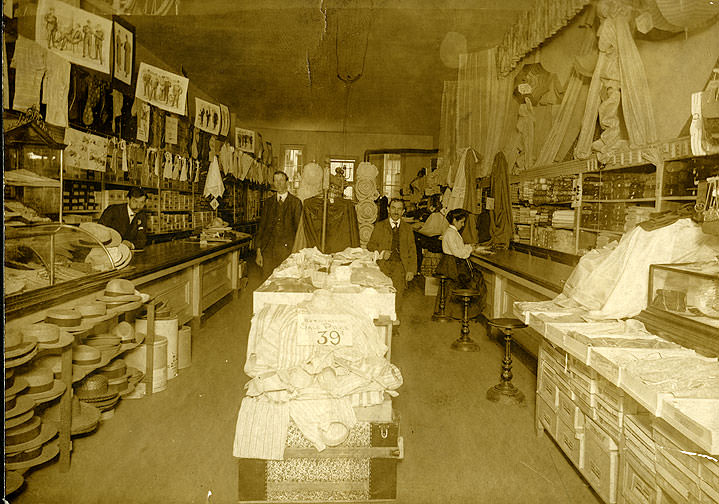
We are looking down through the center of the store. In the left foreground is a counter with three shelves full of hats. Behind the counter, other goods are stacked high, with pictures of men's fashions affixed to the top of the walls. Behind this counter is a clerk, unidentified, leaning on the counter. In the center of the room is another counter. There is a pile of what looks like shirts or pajamas, with a sign on it reading Anniversary price 39 cents. On the right of the image is a counter with boxes underneath, and women's clothing on display in boxes. A long counter with stools runs down the remainder of the right side of the store, with drapery on display near the ceiling. At the rear of the store are two men and a woman.
#77 Fred and Iva Whitney Day at Bordeaux, 1900
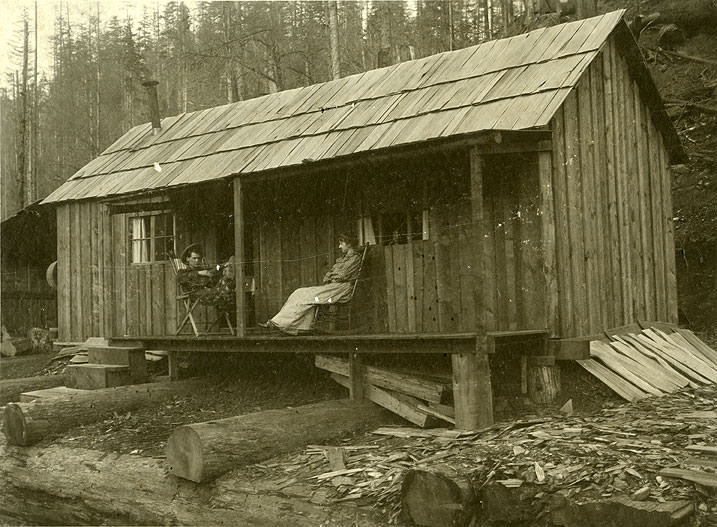
They are sitting on the porch of a rustic cabin with vertical tongue and groove siding, cedar shingles, and a metal chimney pipe. The cabin is propped up on log stumps, and is surrounded by trees, stumps, and wood chips. Mrs. Whitney, a young woman, is wearing a checked skirt and flowered blouse, and is sitting in a rocking chair, smiling at Mr. Whitney. Mr. Whitney is sitting in a folding chair, with his feet propped up against a slender piece of timber holding up the porch roof. He is playing a guitar. He is wearing a hat. The cabin has two sashed windows and a door opening.
#78 Young women of legislative session in Governor Hay’s automobile, Olympia, 1909
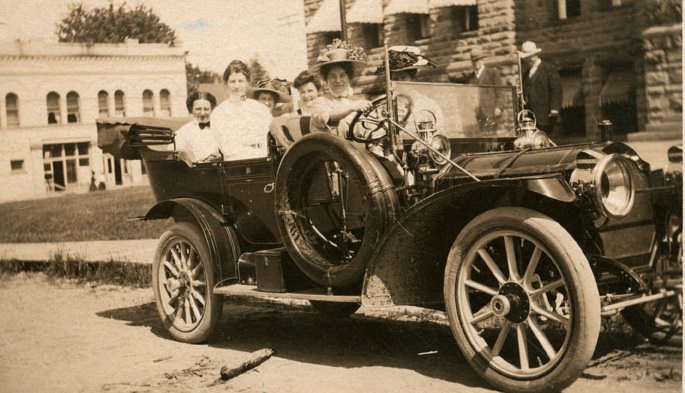
The identities of five of them are provided in the subject field of this record. The sixth may be the writer of the postcard, identified only as "Jane." They are sitting in an automobile in front of the Old State Capitol Building. The postcard text identifies the car as belonging to Governor Hays. They are wearing summer-weight dresses or waists consisting of tops with wide sleeves, narrow waistbands, and long skirts. On the steps of the building is attorney Frederick W. Loomis and another unidentified man. In the background is the Reed Building.
#79 Clarence Bethel Grocery, 1900s
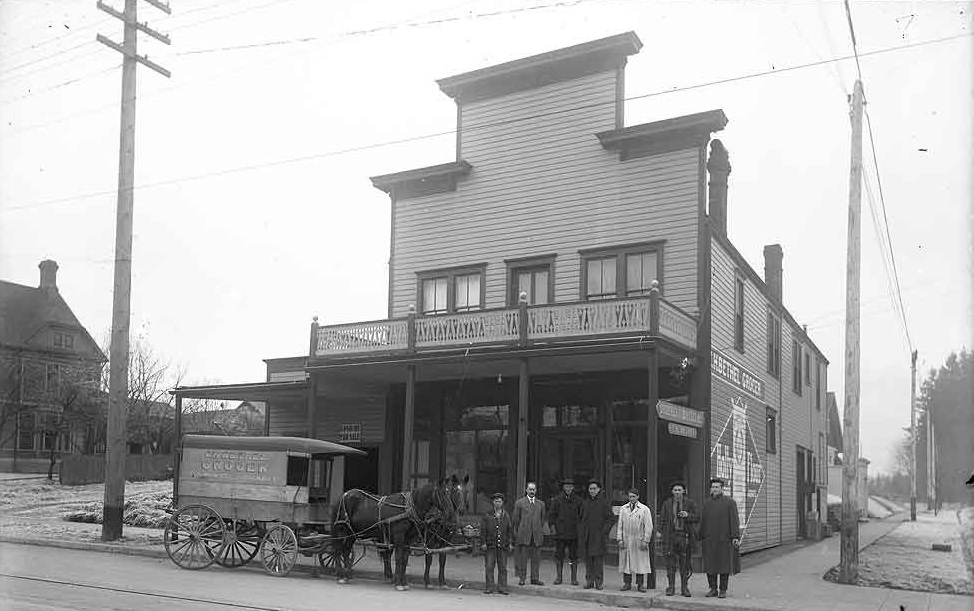
It is a two-story clapboard building with a false front. Painted on the side are the words C.H. Bethel Grocer, and an ad for Holly Flour. There is a wide porch in front of the store, with a sign reading Groceries, Flour, Feed, C.H. Bethel. Another sign reads Gasoline for Sale. Six men and a boy are standing on the paved sidewalk next to a delivery truck. One of the men has a white overcoat. All are wearing outerwear except one, who is in a suit.
#80 Funeral procession for Governor Samuel G. Cosgrove, 1909
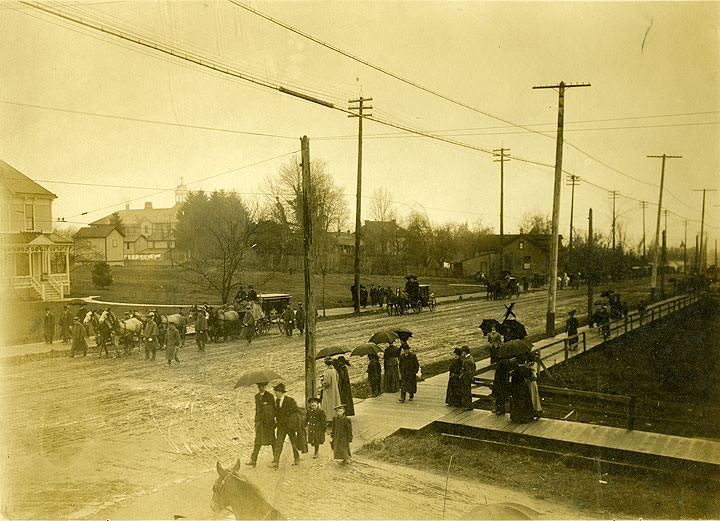
The hearse is proceeding southward on Main Street (now Capitol Way), Olympia. It is a wide, muddy street. The hearse is being pulled by six horses, identified in the inscription as being owned by the firm of Bolster and Barnes. Flanking the hearse are several young men wearing light-colored coats. Behind the hearse are two buggies, each pulled by two horses. On either side of the street are wooden sidewalks with somewhat sparse attendance of spectators, many holding umbrellas due to rain.
#81 Nathaniel Ostrander House, Washington Street and 8th Avenue, Olympia, 1909
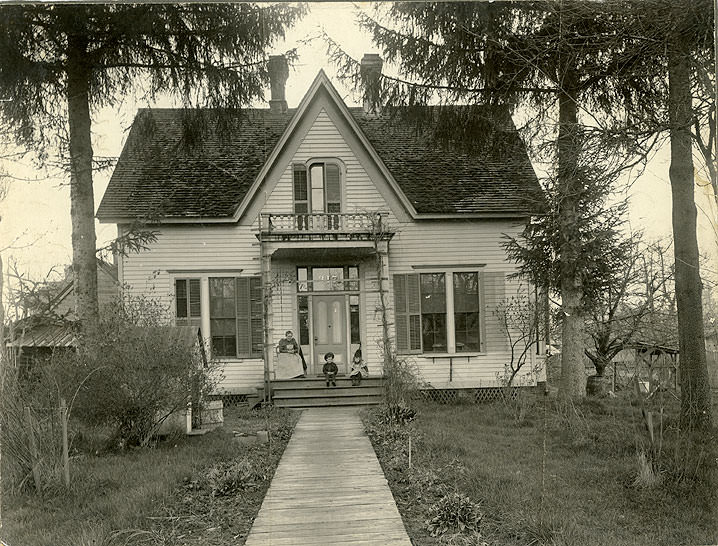
It is a Victorian cottage with peaked gable, two sashed windows on either side of a central opening. The number 317 is painted in gold over the doorway. A long wooden boardwalk leads across an unkempt yard to the entryway. On either side are evergreen trees, and an outbuilding can be seen to the rear. Sitting on the front porch is a woman with a white apron, identified as Mrs. M. O'Connor, sister of Nathaniel Ostrander.
#82 Joseph Longmire (Jr.) home, of South Bay, Olympia, 1900
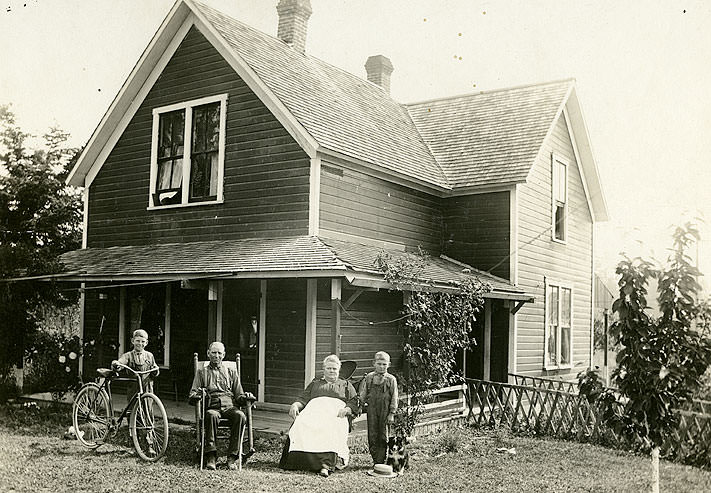
It has a wraparound porch with an overhanging eave, and is painted a dark color with white trim. A middle-aged man and woman are sitting in rocking chairs on the front yard. The man has a cane in his right hand. .The woman is wearing an apron. Two young boys, identified as Harry and Roy (Longmire), are flanking them. The bigger boy is holding a bicycle.
#83 Carlton House, Olympia, 1902
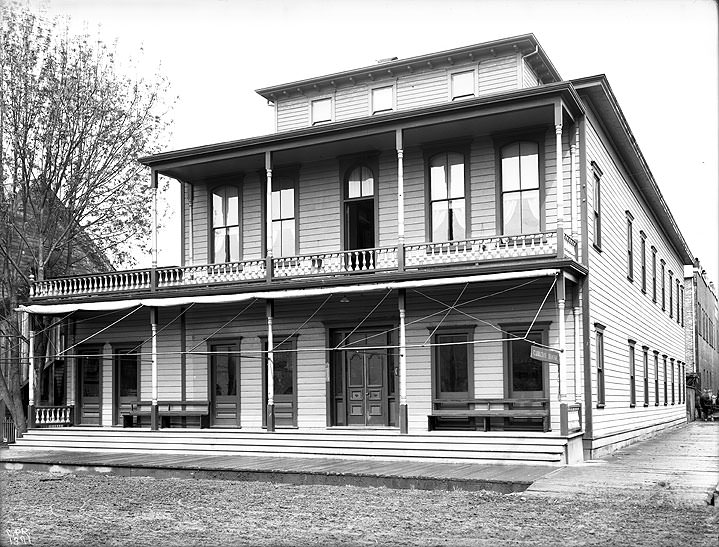
This hotel was located at 114 Columbia St NW. It is a two-story clapboard sided building with an additional gable at roofline. A balcony extends the length of the second story, supported by slender posts. A door leads out to the balcony. There is a wide porch on the ground level, with benches at either end. A set of steps leads up to the porch, and over the steps is the framework for an awning. Two-over-two sashed windows extend the length of the front and side of the second story, with tall windows along the ground level by the porch.
#84 Soldiers Burial Day, Spanish American War, Olympia, 1900
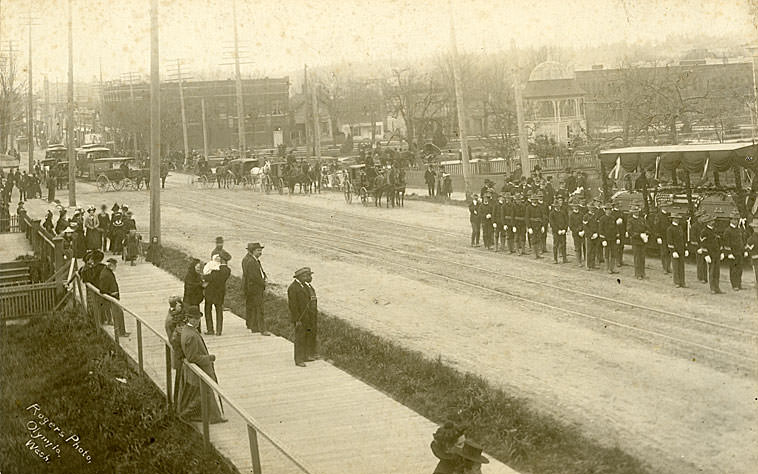
At the right of the image, we can see a a very long, open sided hearse, proceeding up Main Street (now Capitol Way). To the side of the hearse is a double line of soldiers wearing white gloves. Behind this group we can see the gazebo of Sylvester Park. Trolley tracks run along the wide street. Behind the hearse is a row of carriages. Trolleys are stopped as the procession goes by.
#85 George A. Barnes Home, Olympia, 1902
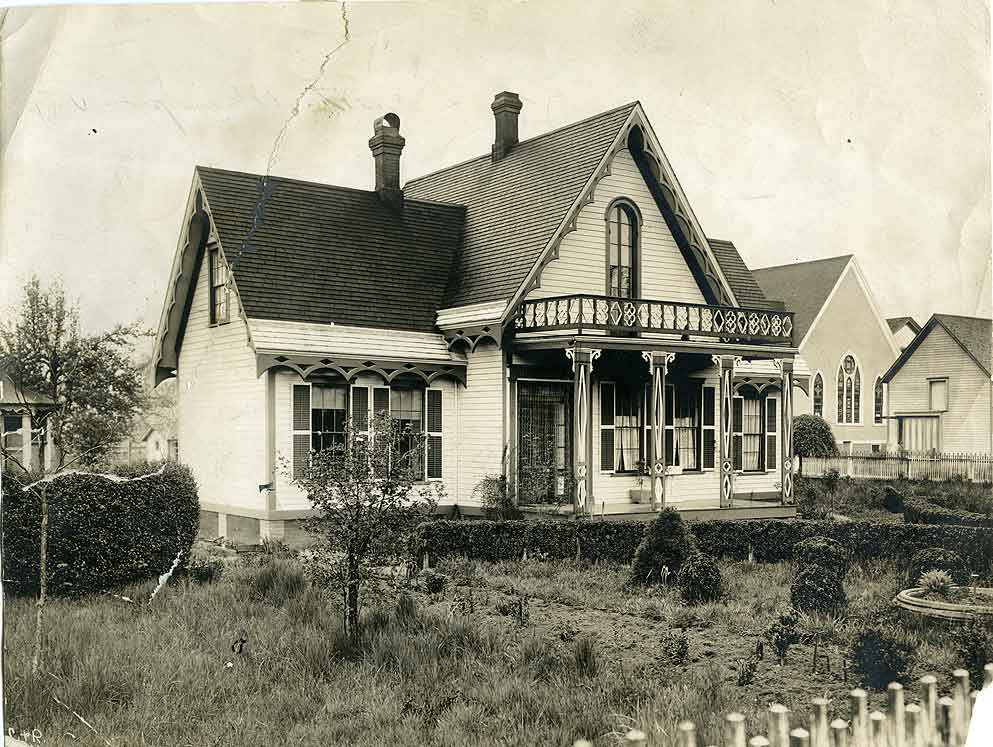
It is heavily ginger breaded with trim at eaves, ornately scrolled columns supporting an upper story balcony with scrolled trim. Sashed windows with shutters run across the front of the house. A vine trellis runs up one side of the front entrance porch. The front yard is unkempt, with several small shrubs and a planter or fountain visible at the right side of the image. The lot to the left of the house appears vacant, or is a field. To the right of the house, in the rear, is a church with stained glass windows, the United Presbyterian Church. Other houses can be seen to right and left of the home.


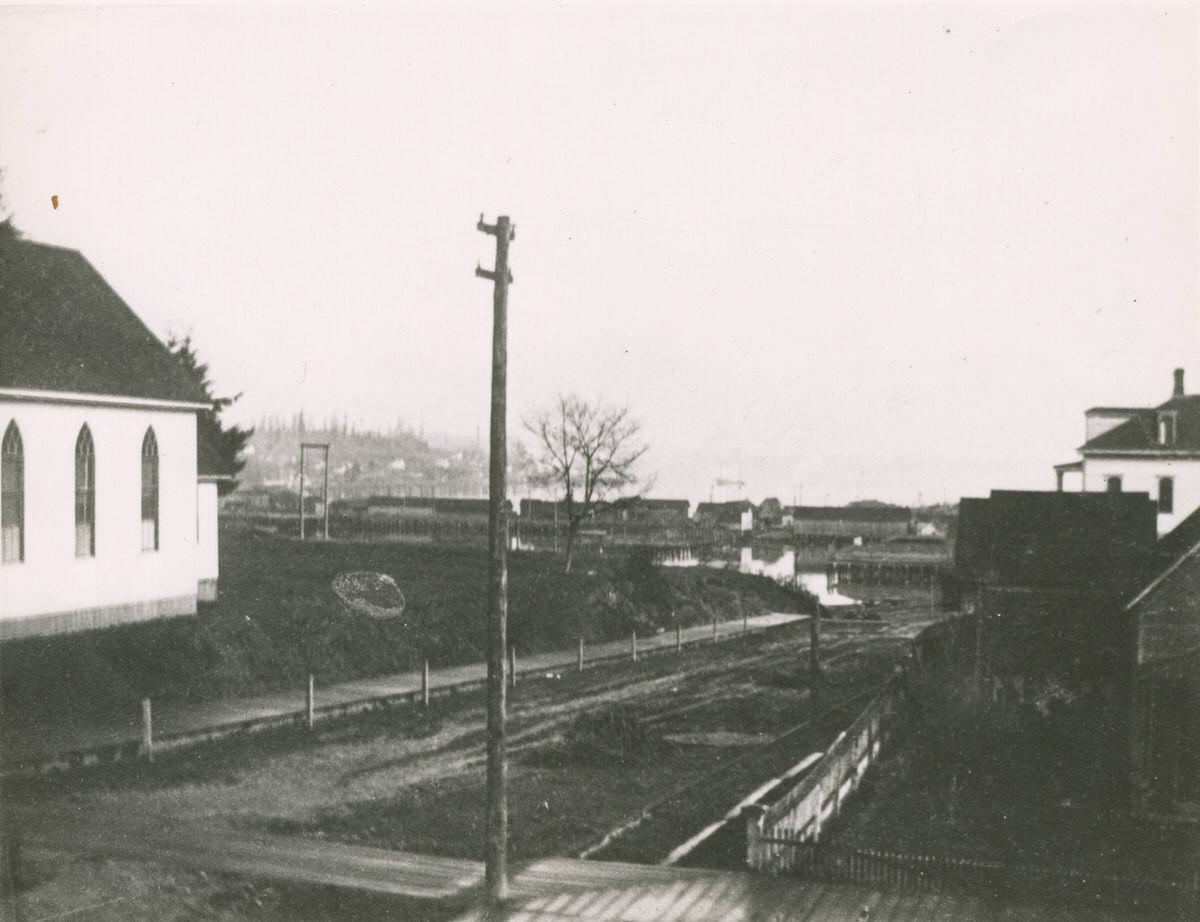
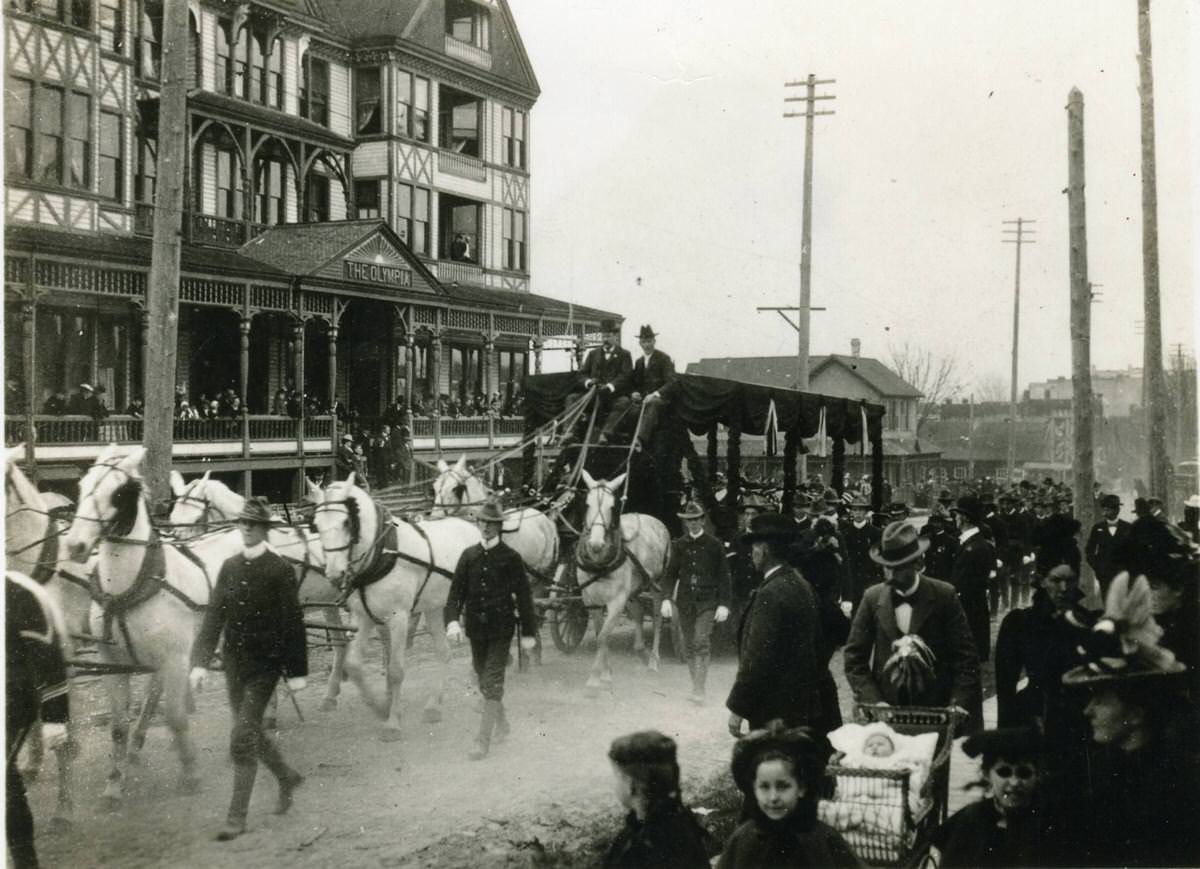
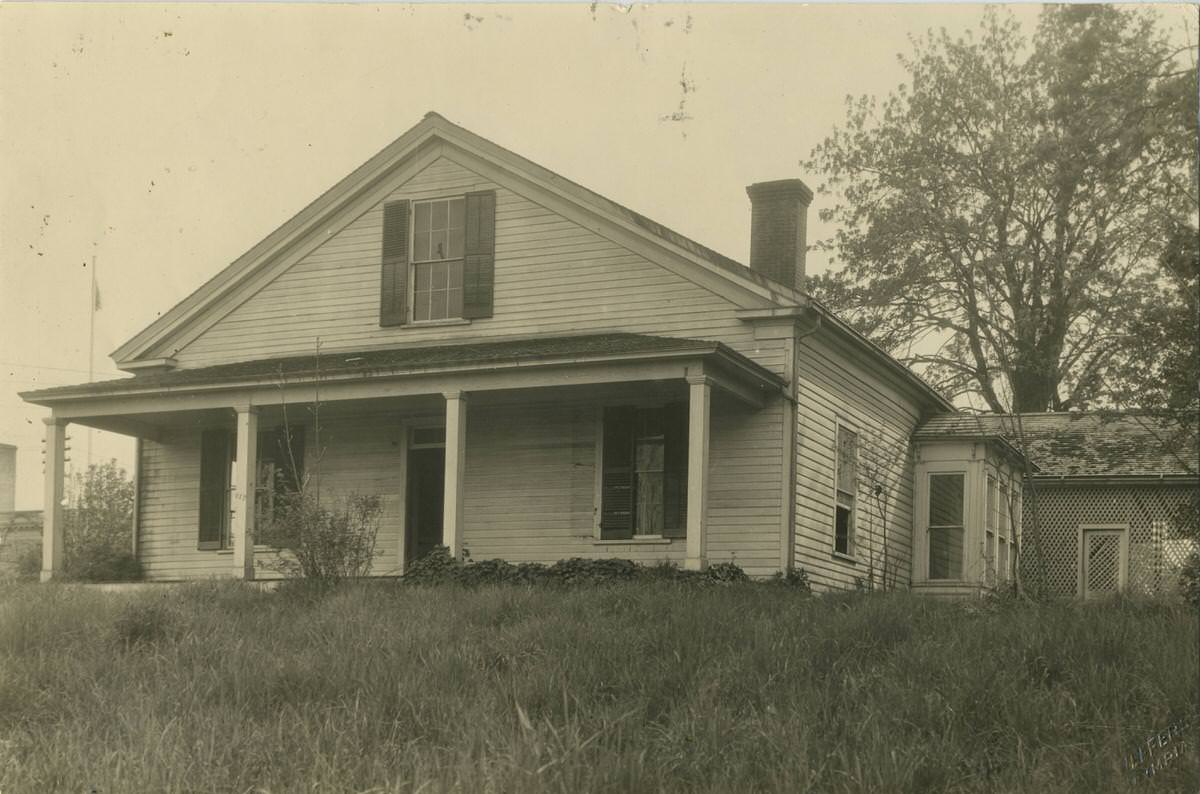
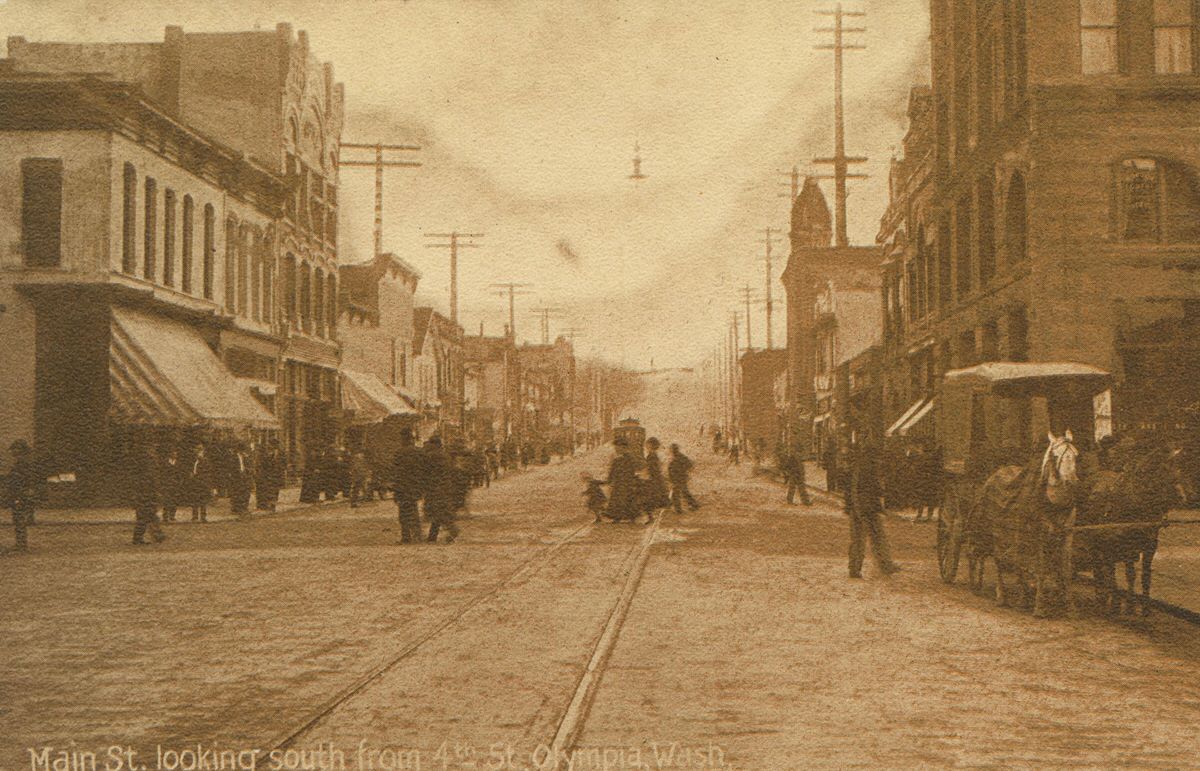
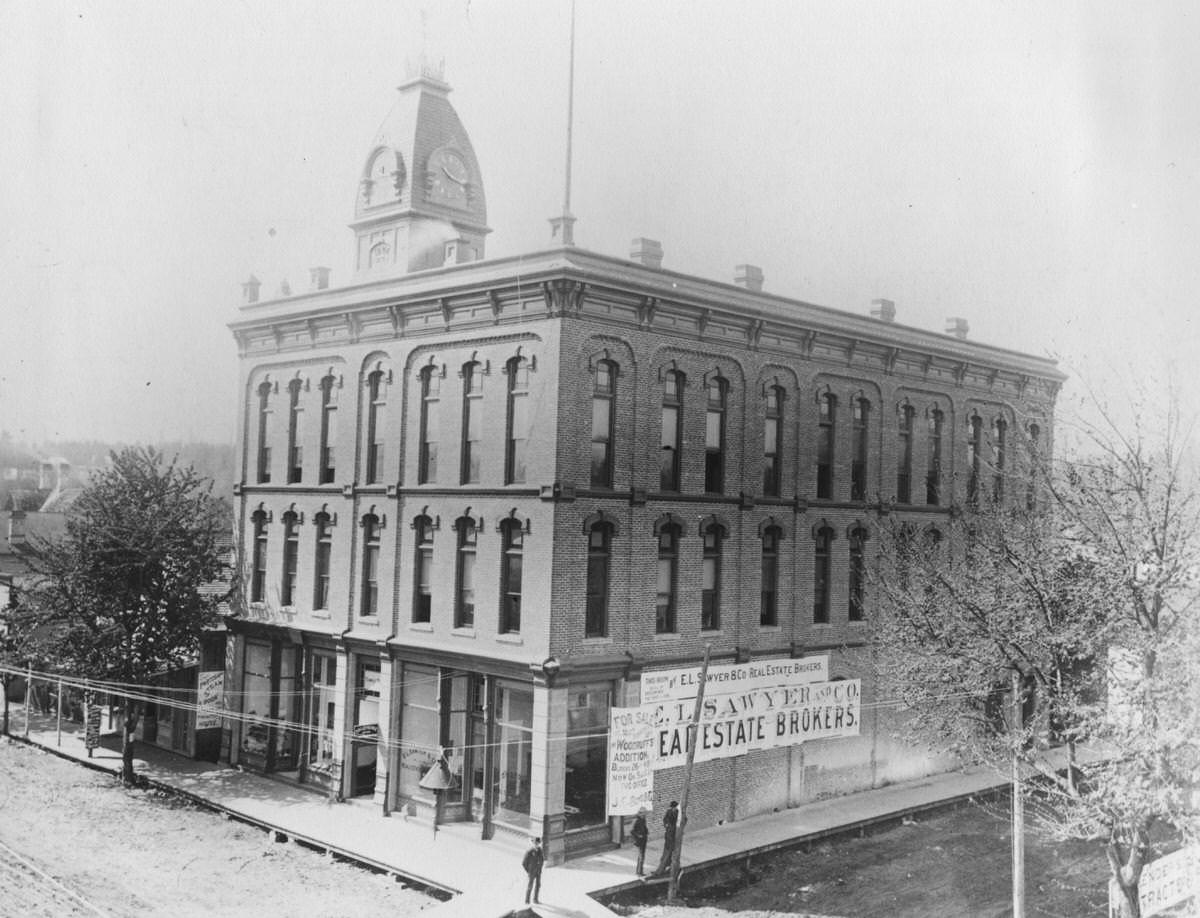
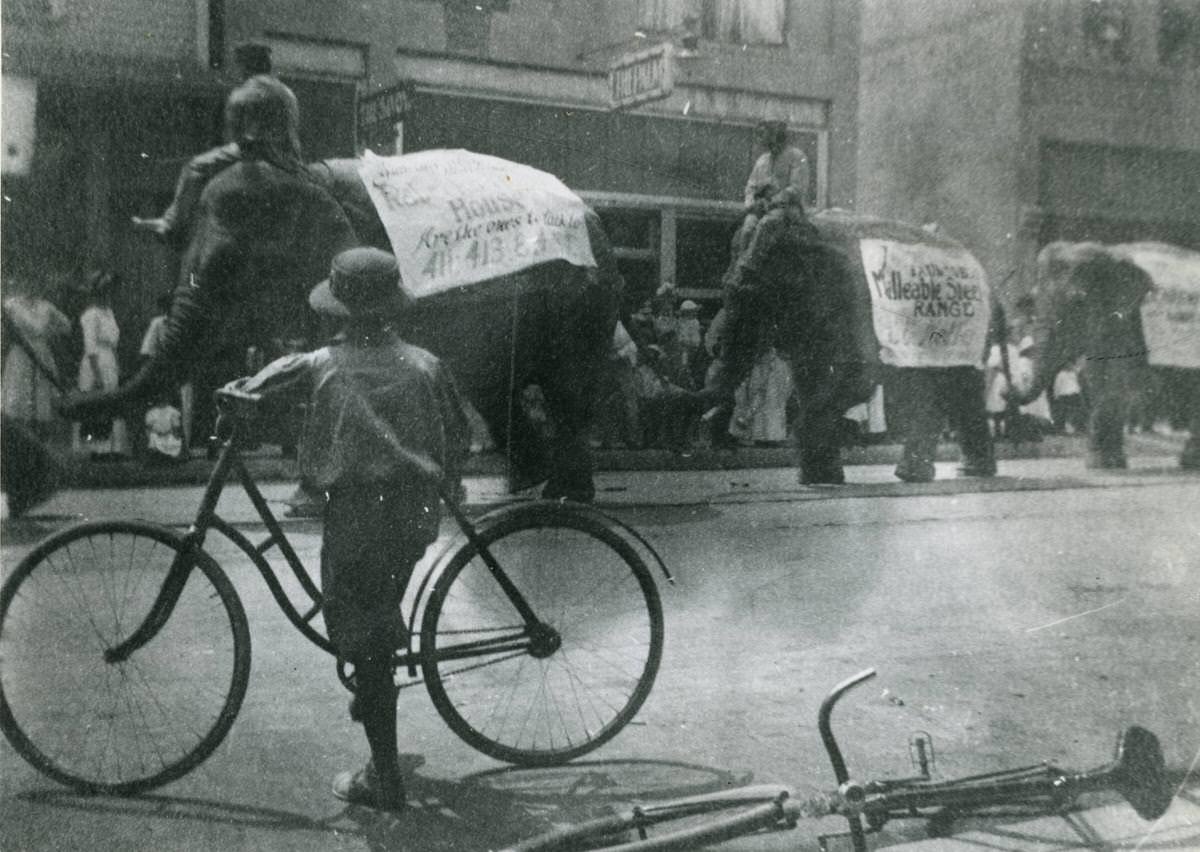
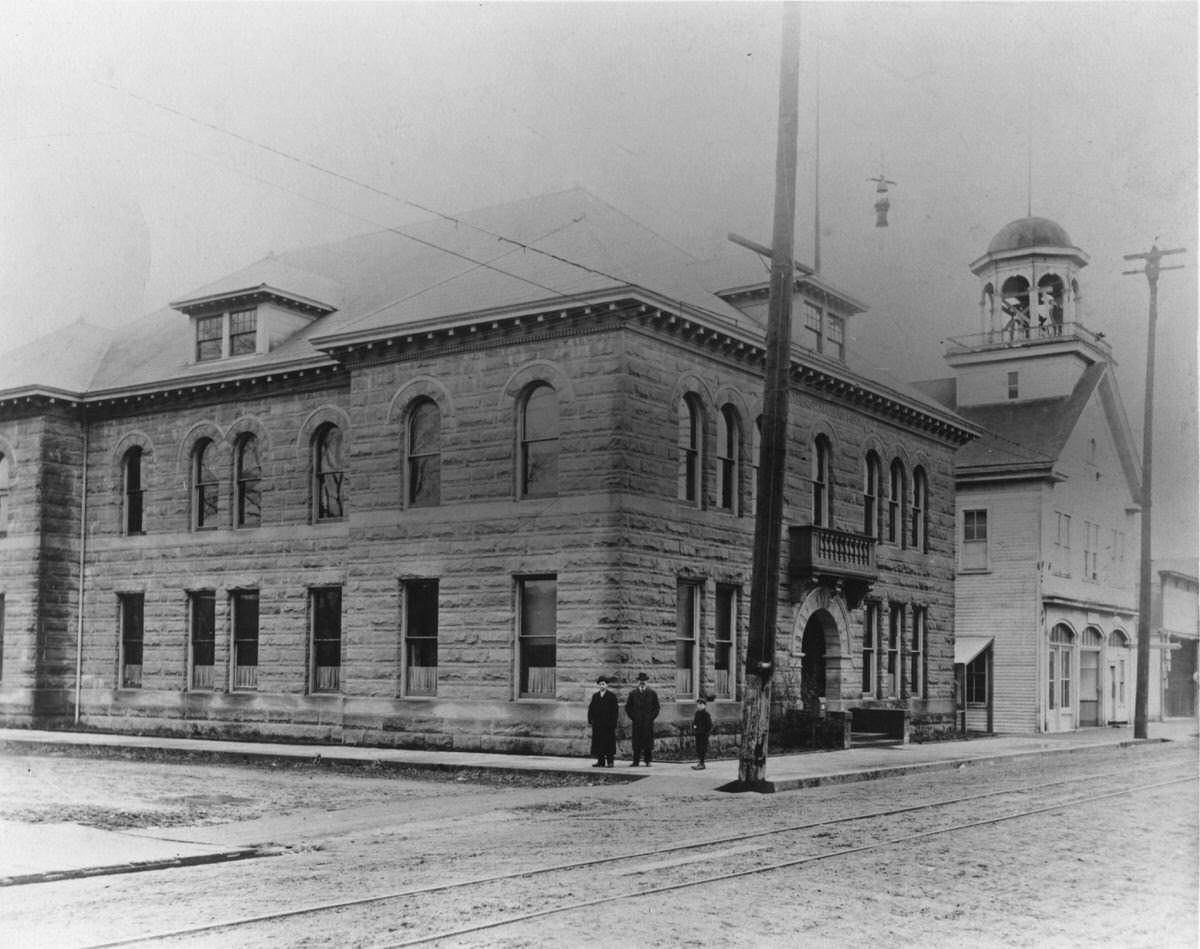
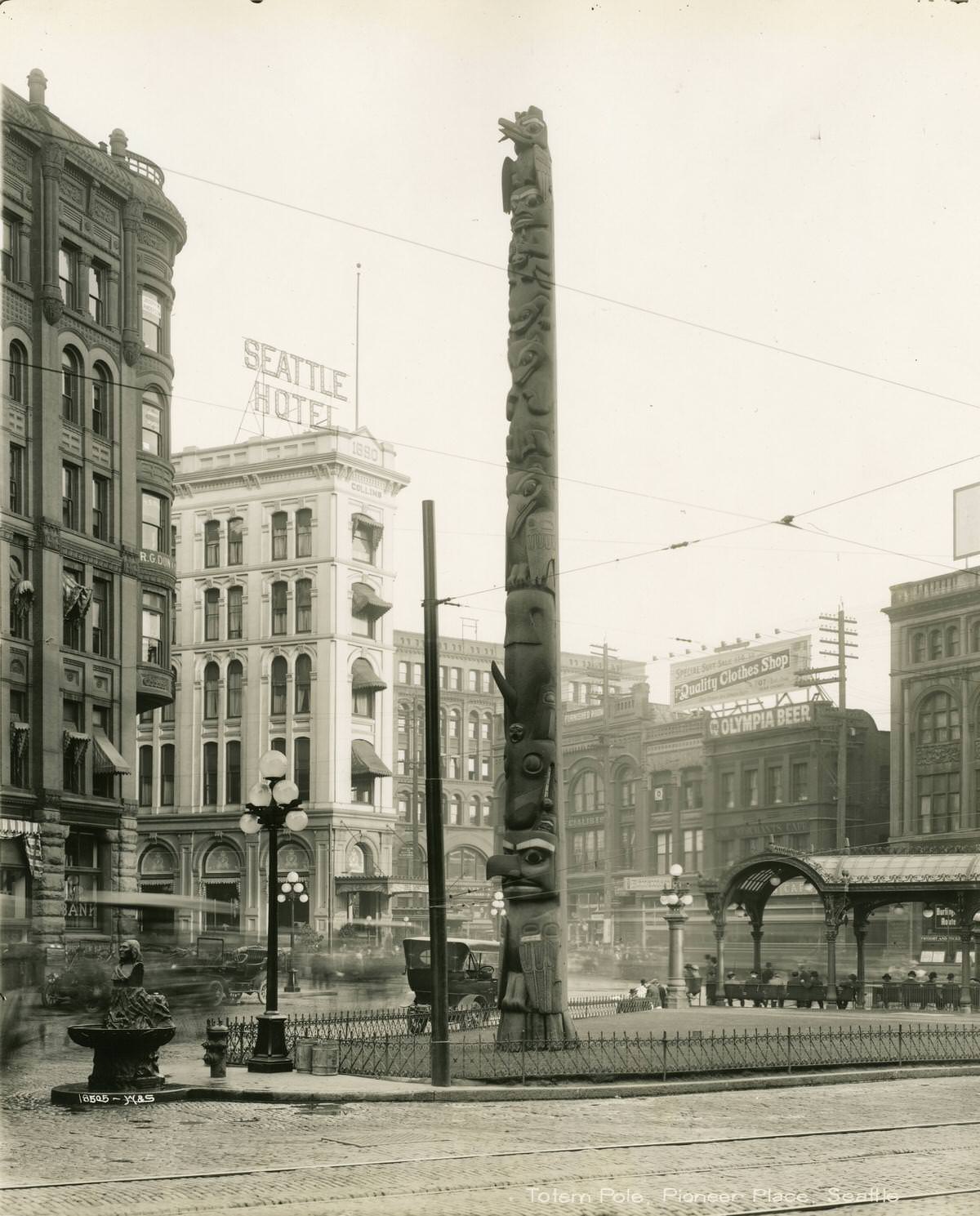
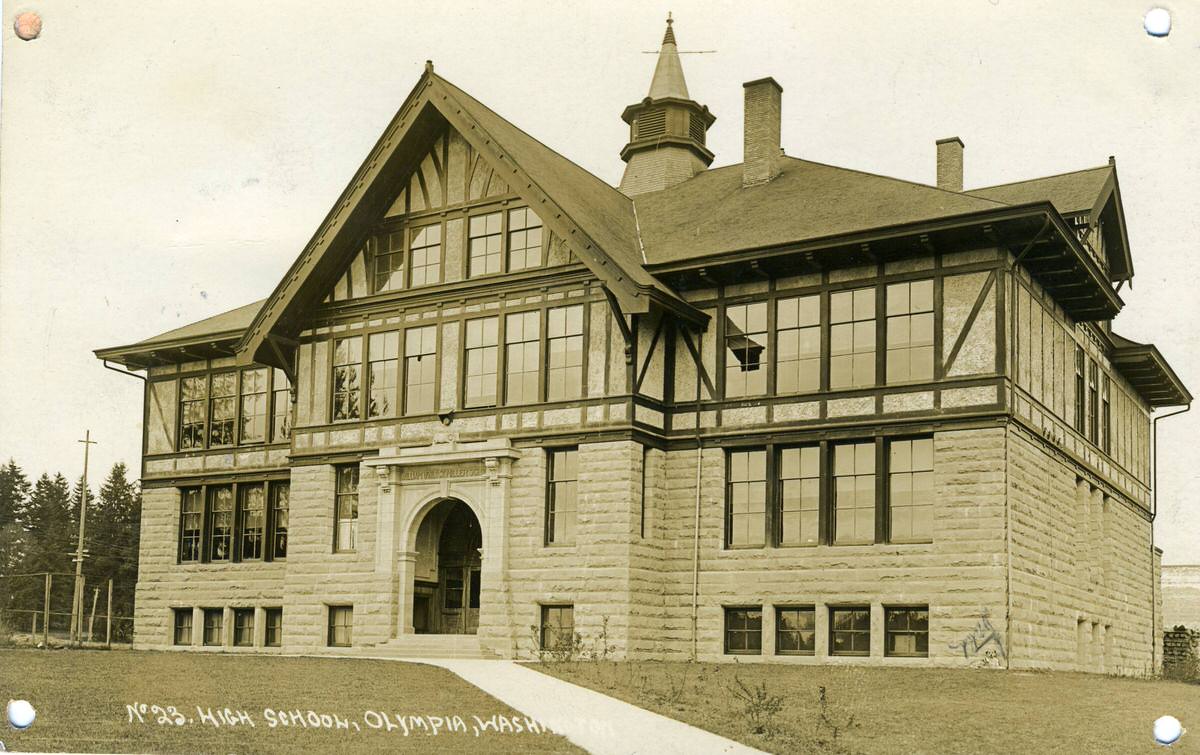
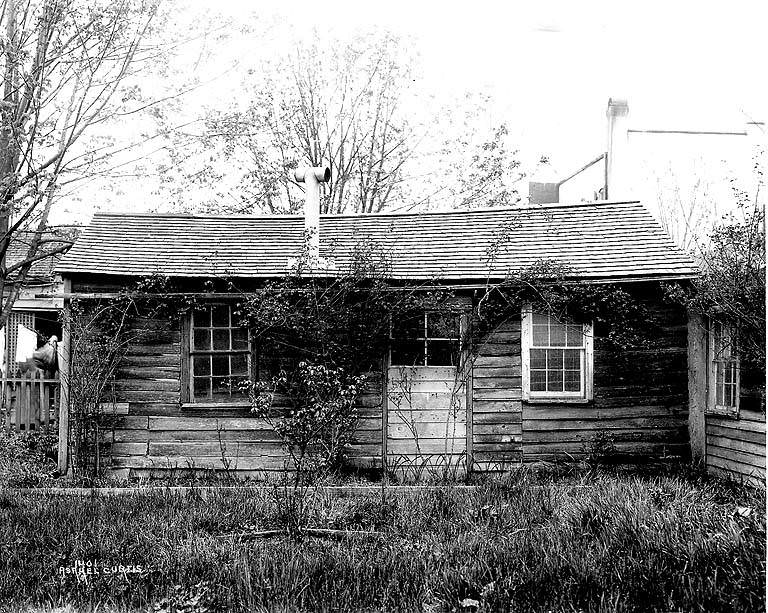
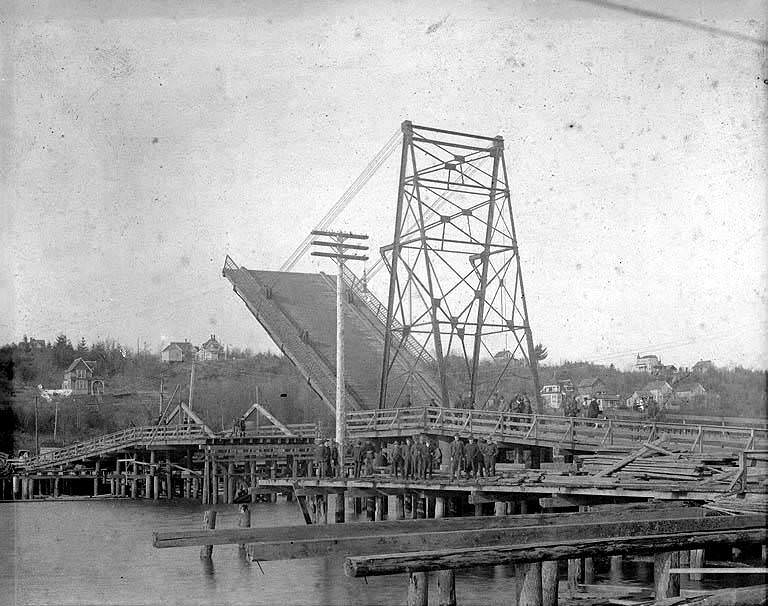
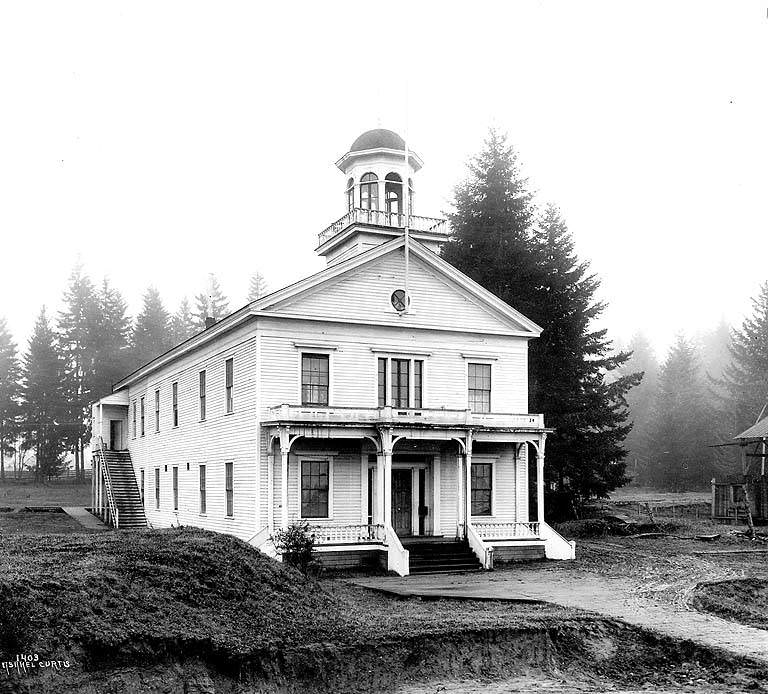
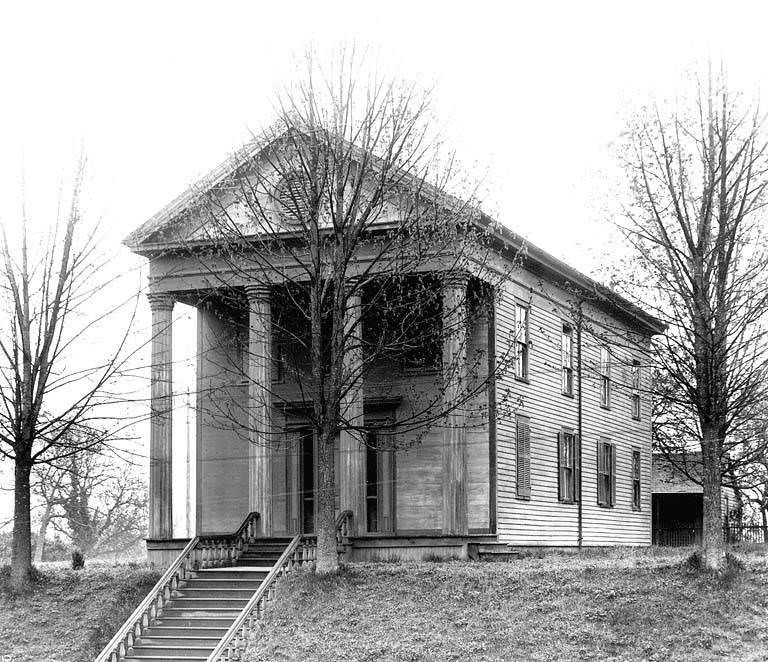
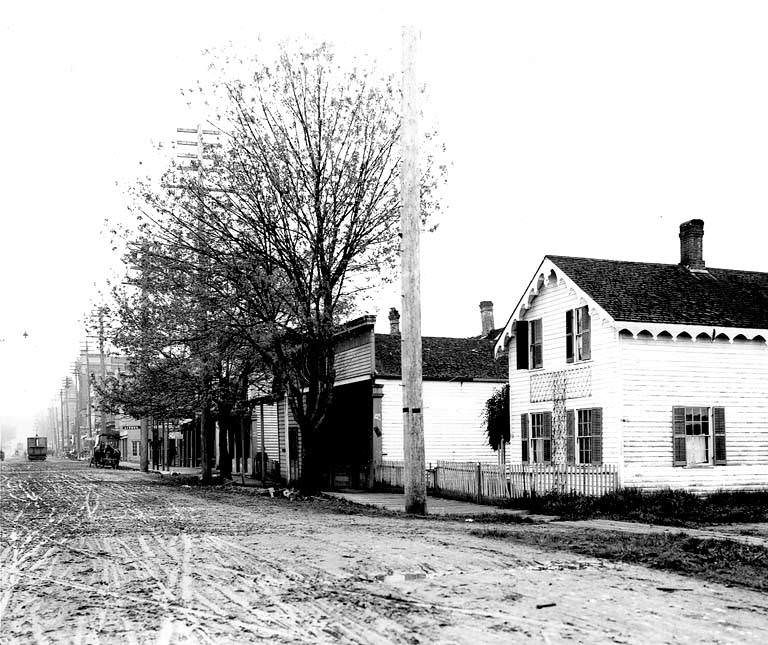
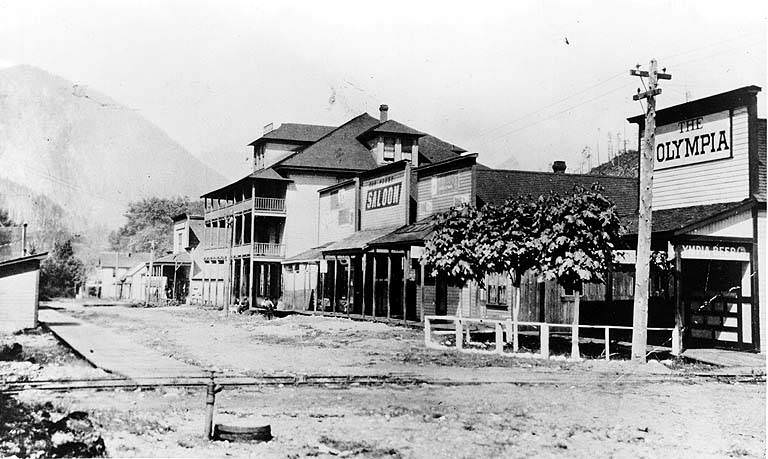
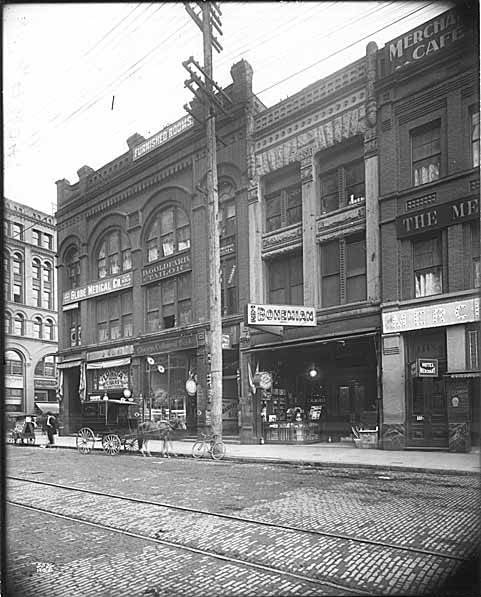
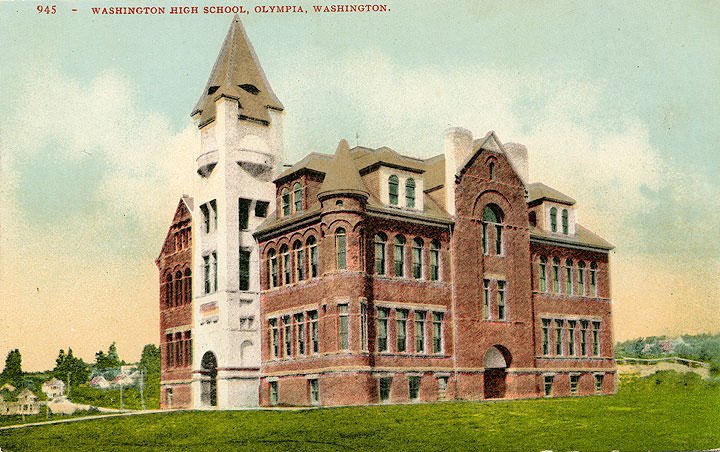
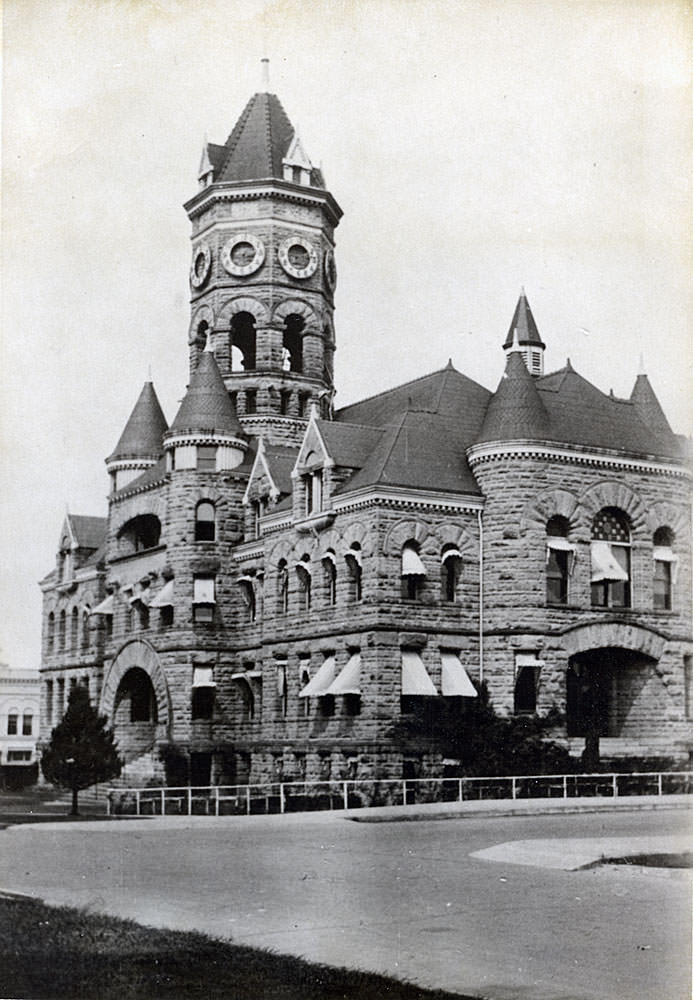
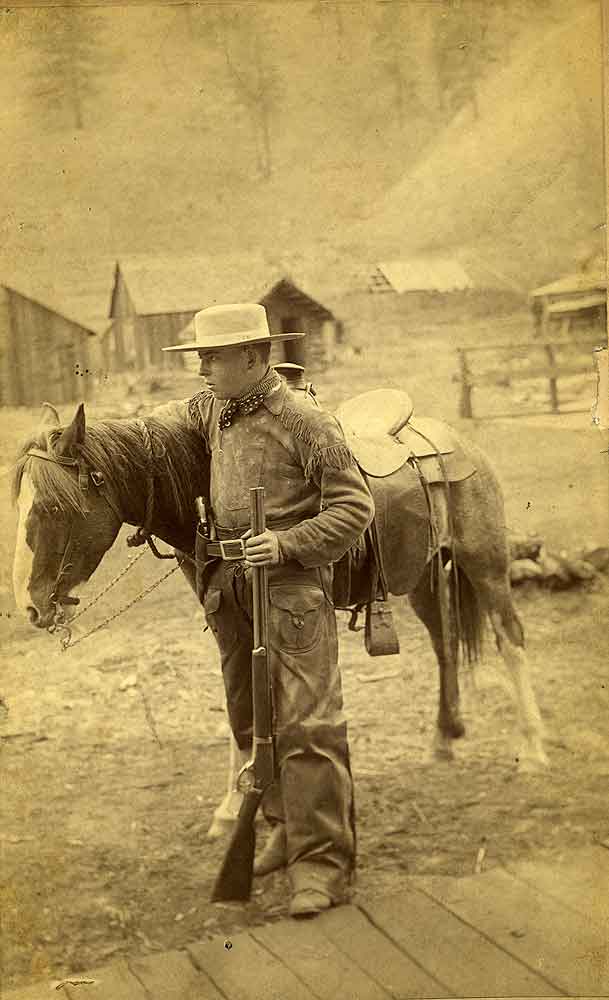
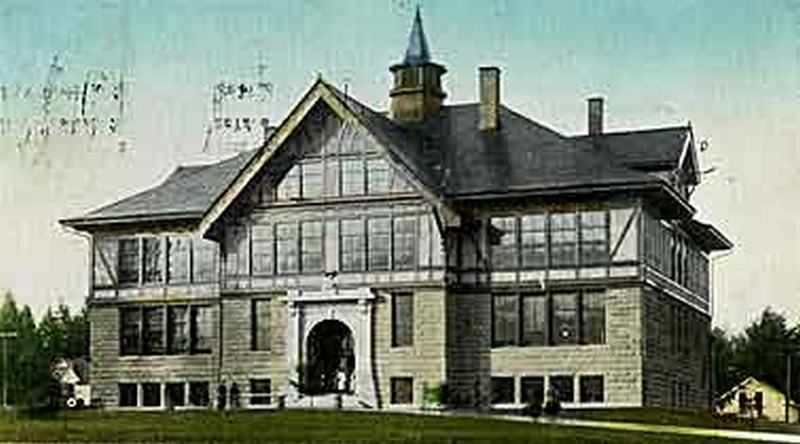
![High School [Washington School] Olympia, 1908](https://www.bygonely.com/wp-content/uploads/2022/01/olympia_historical_photos_444.jpg)
